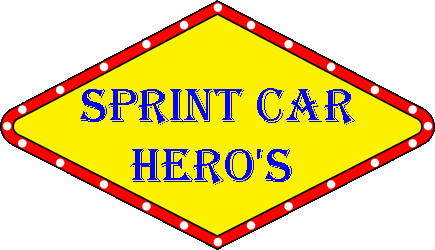



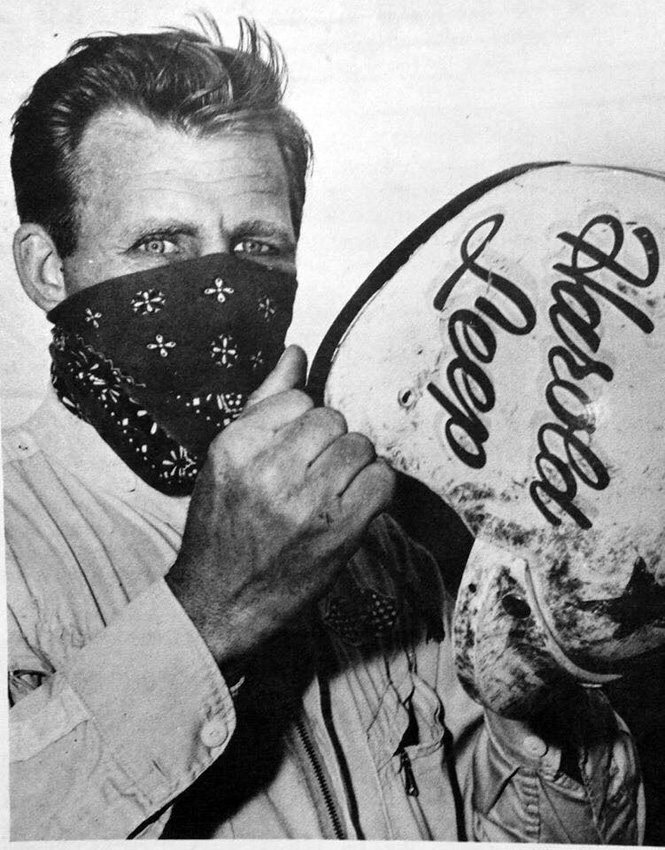
Harold
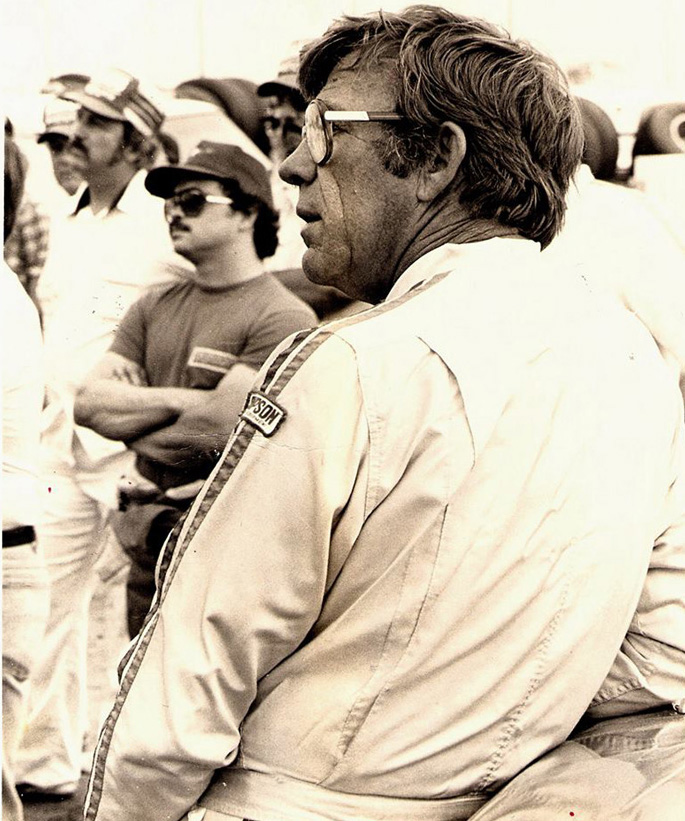
Harold
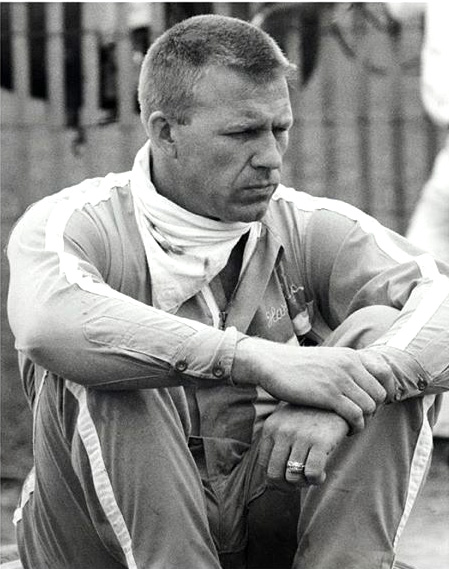
Harold
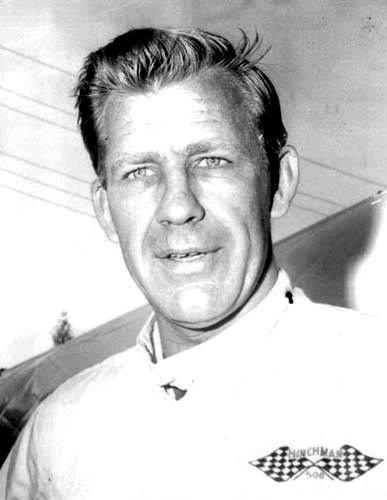
Harold
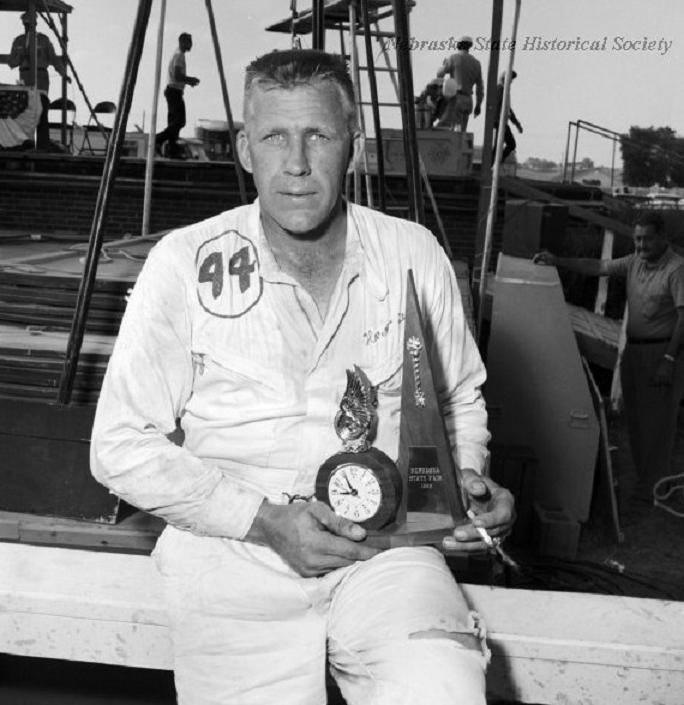
Harold
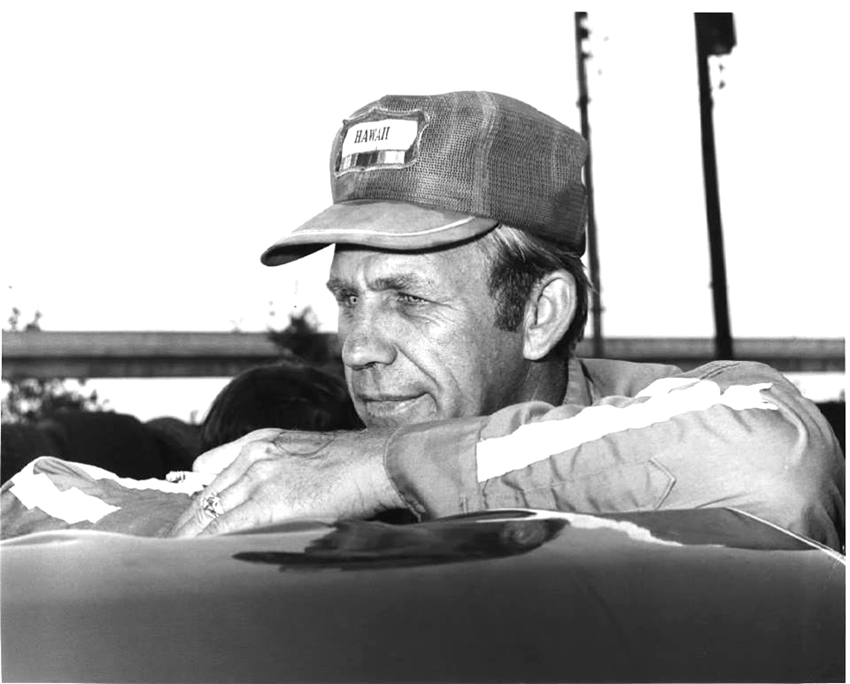
Harold
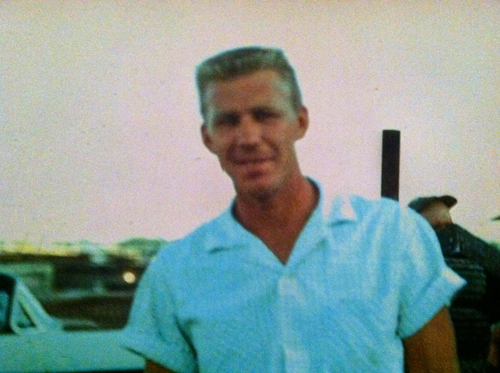
Harold
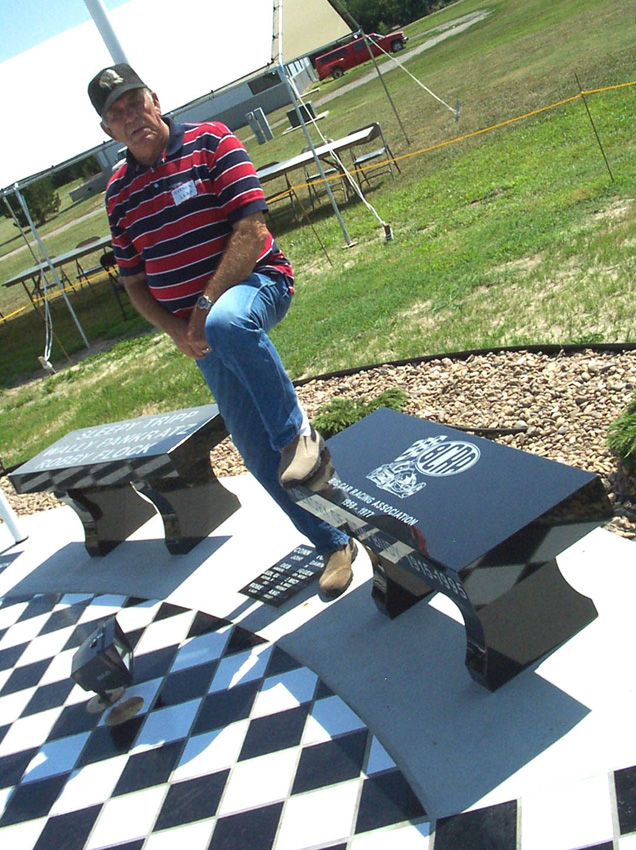
Harold at Belleville Museum victory circle
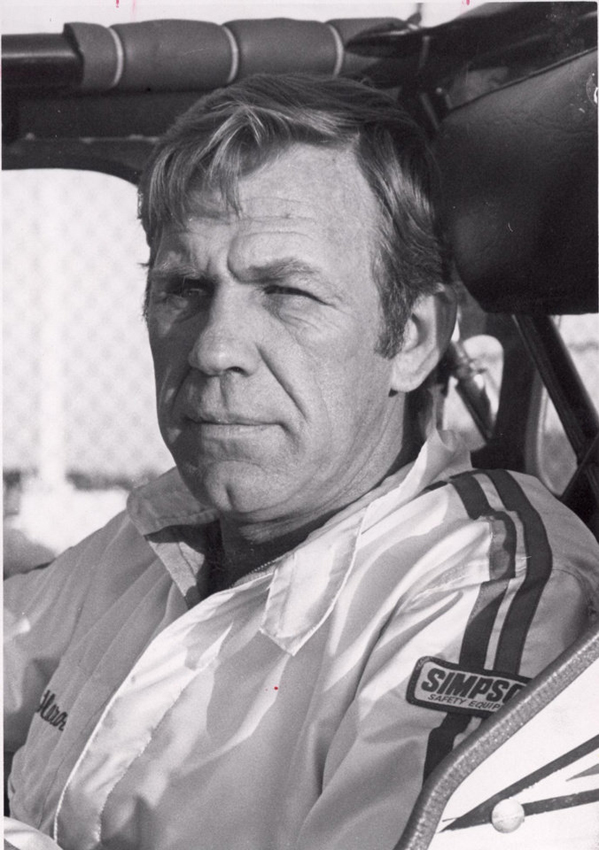
Harold
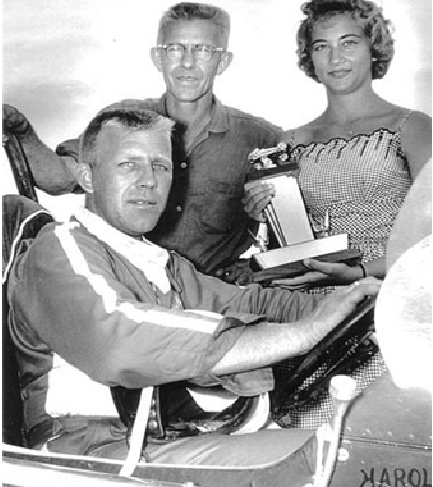
Harold
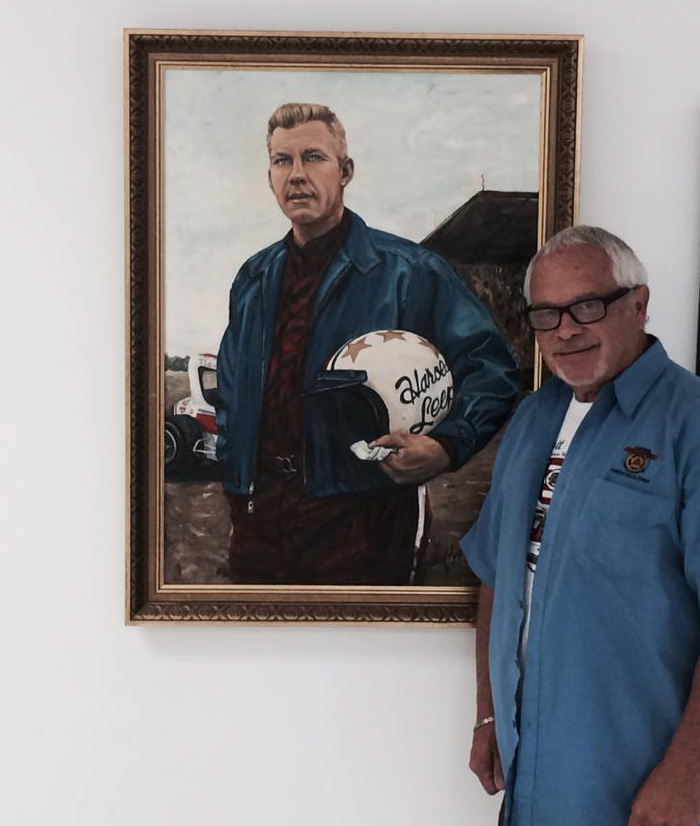
Harolds picture with Shane Carson

Harold
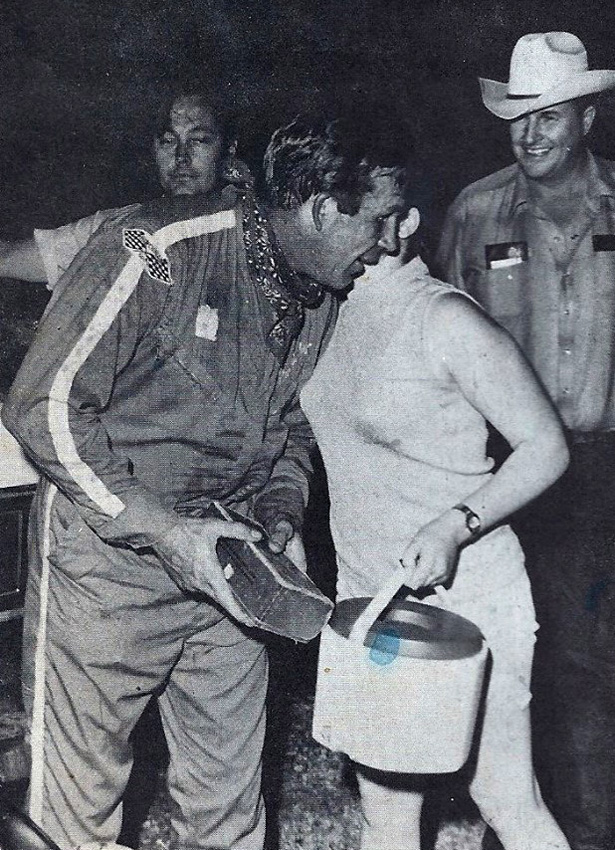
Harold kissing his wife
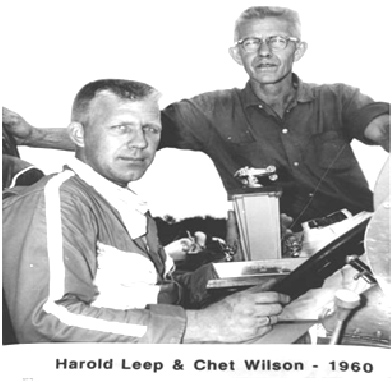
Harold and Chet Wilson 1960
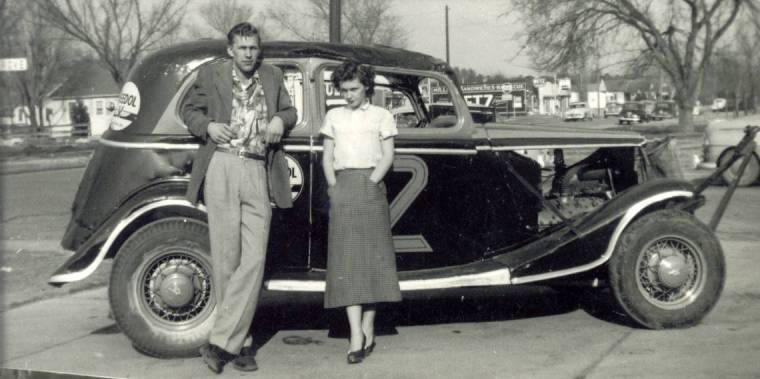
Harold and Sybil
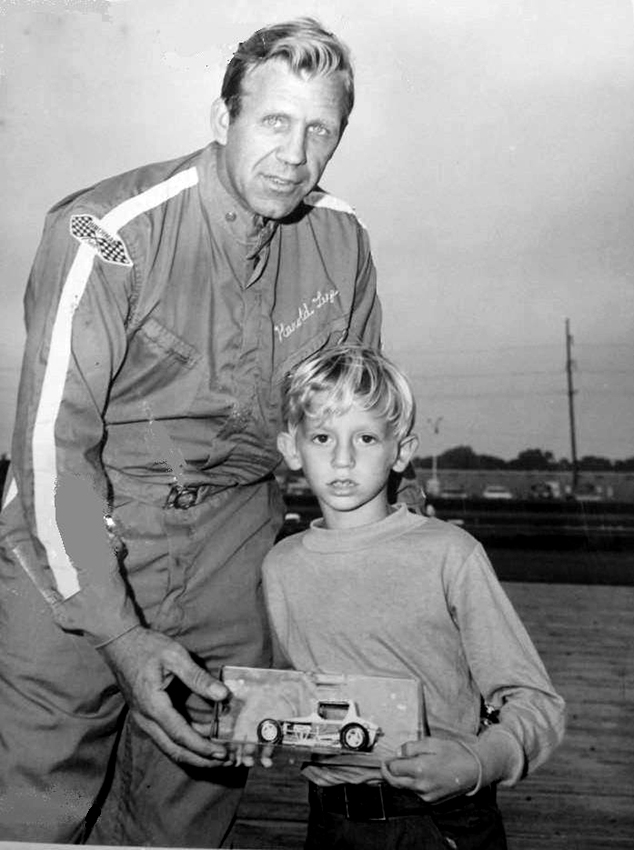
Harold with a little guy
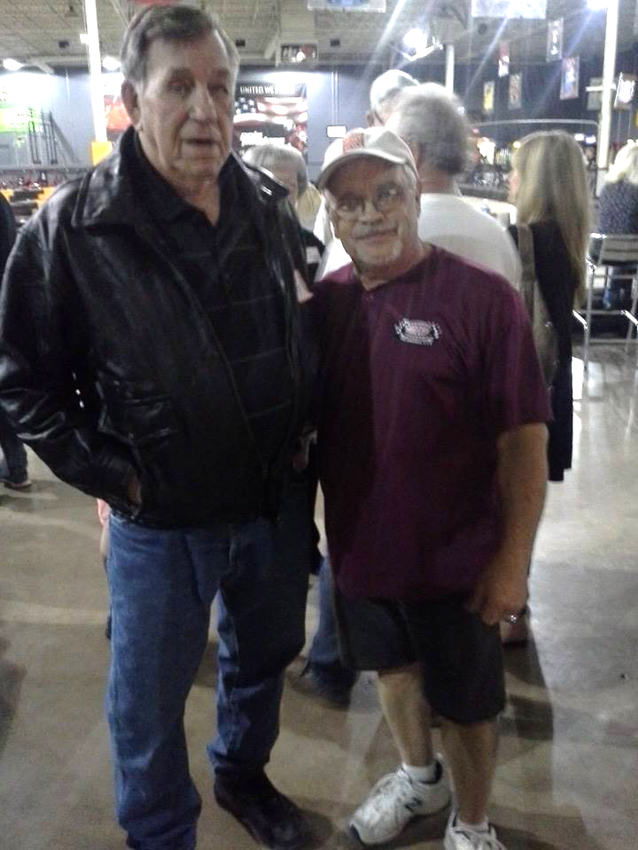
Harold with another little guy, oops that's Shane Carson PLUS 2
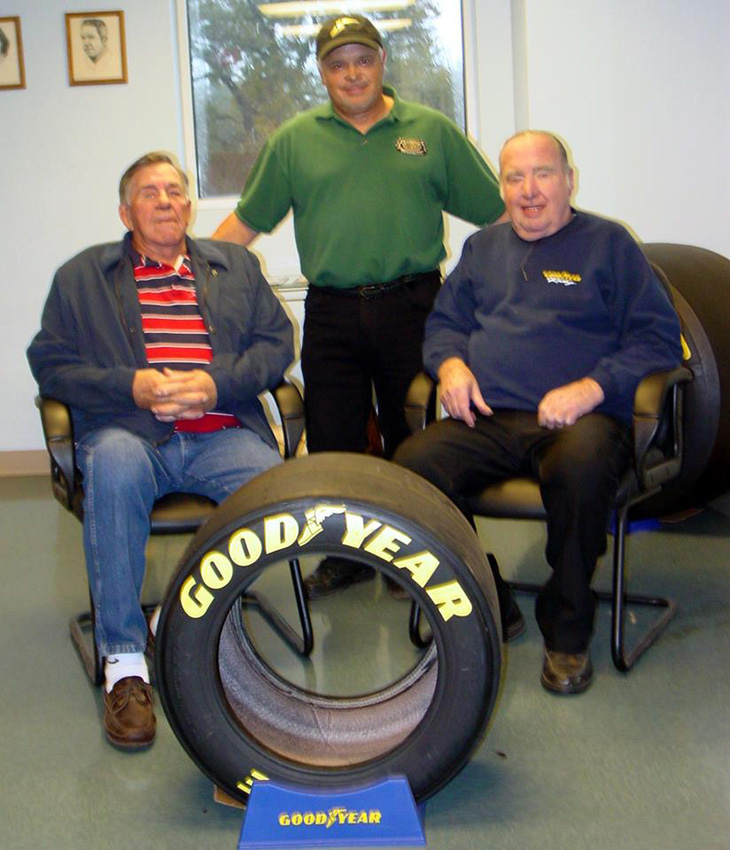
Harold with Shane Carson and Jerry Maxwell
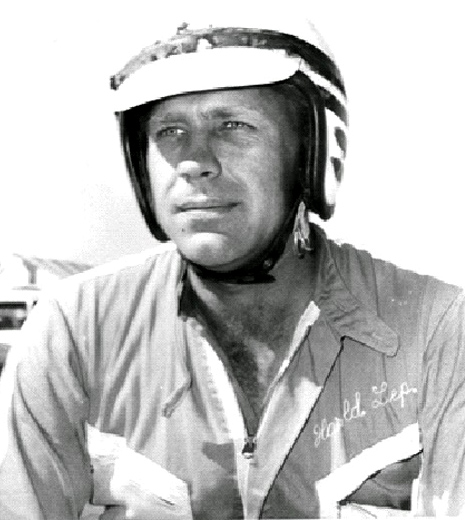
Harold and Chet and the trophy girl
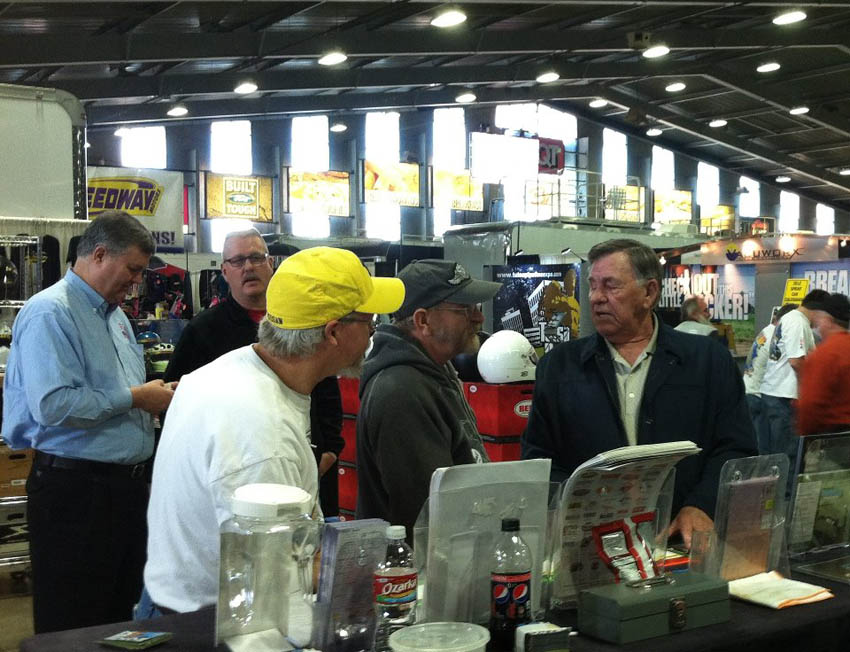
Harold on the right
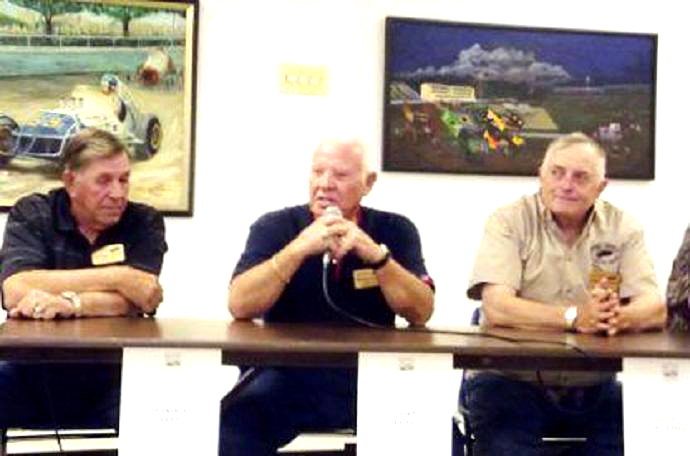
Harold with Casey Luna and Lynn Paxton
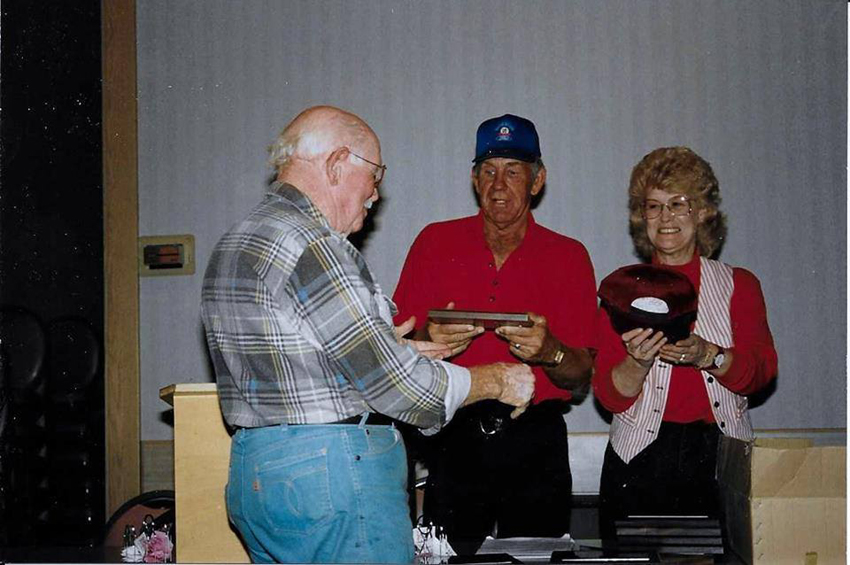
Harold and his wife with Kack Hitt
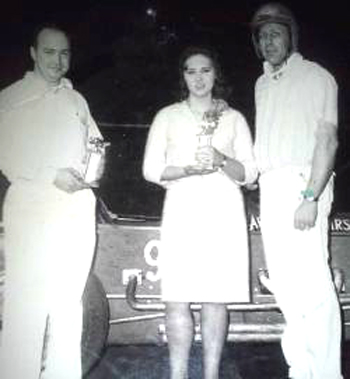
Harold with car owner Jelly Wilhelm and trophy girl
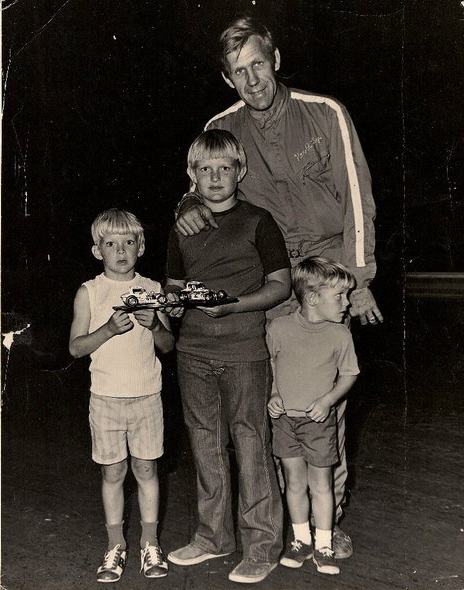
Harold with some kids
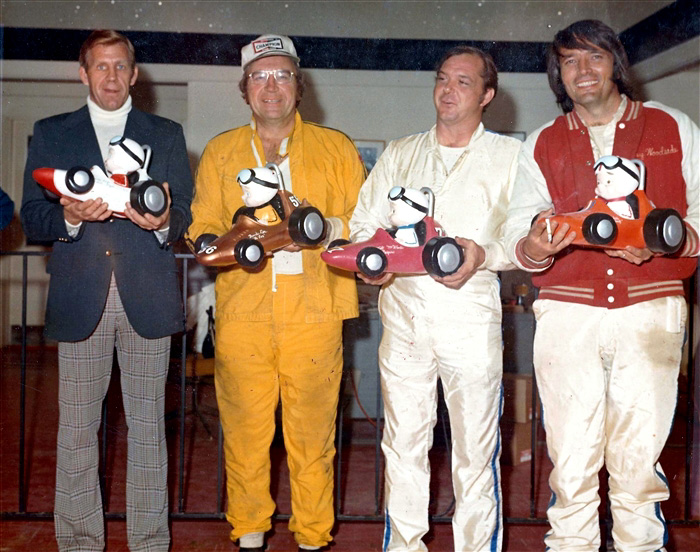
Harold with Frank Lies, walt McWhorter and Jay Woodside
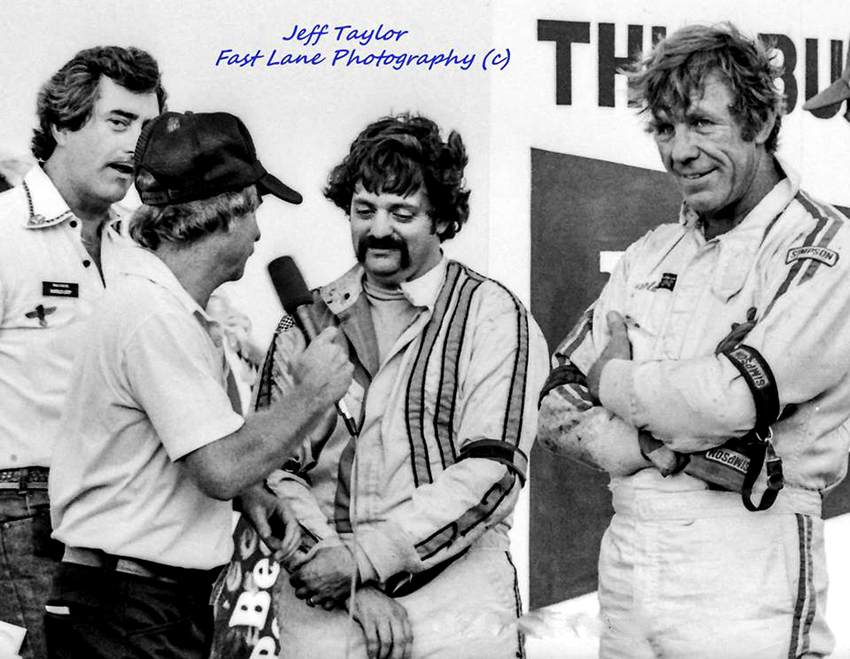
Harold watches as Ben Buckland interviews Jerry Stone
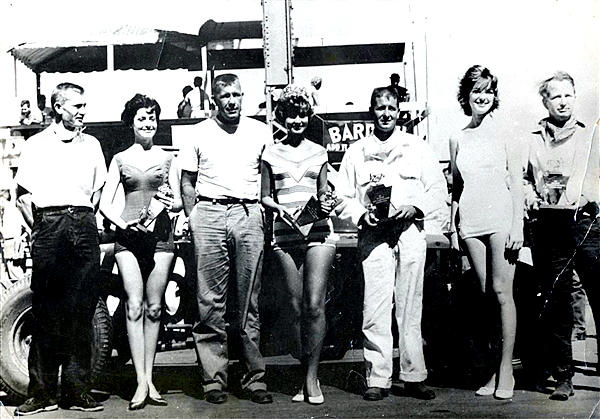
Harold, 2nd from left, with the heat race winners for 1961 Nationals
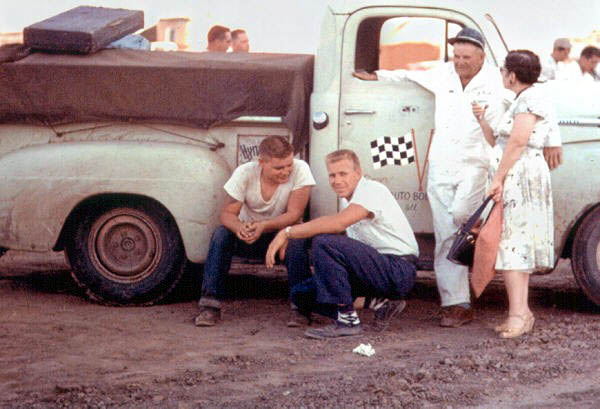
Harold kneeling by the pick up
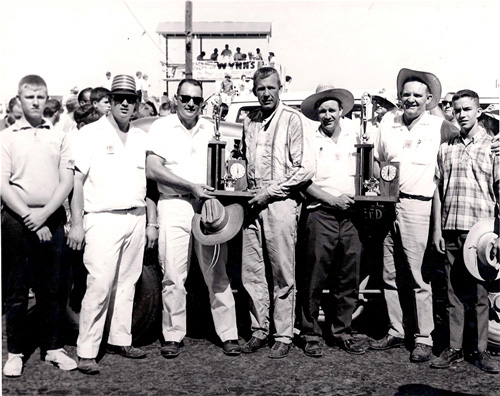
Harold after winning the 1967 Nationals
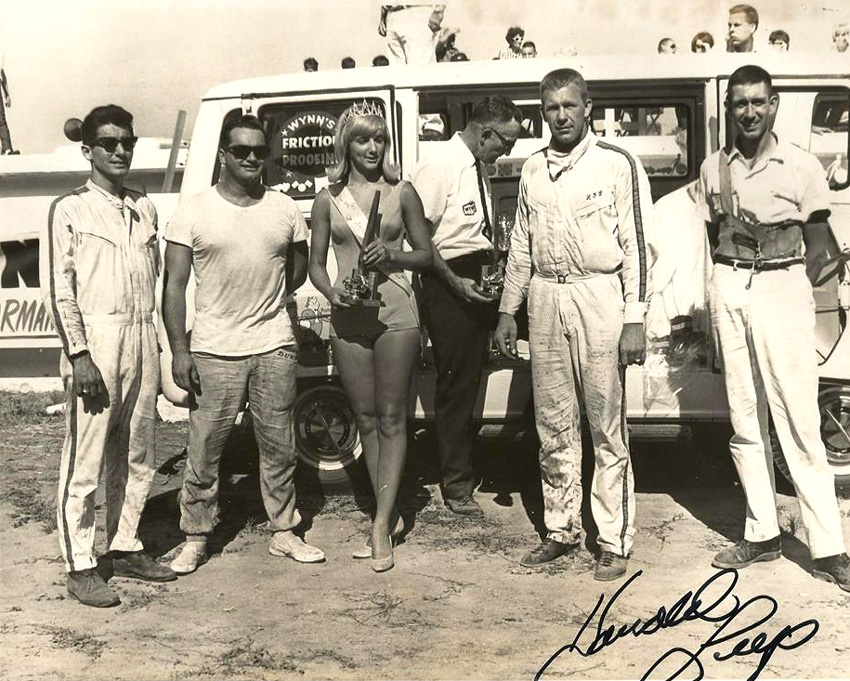
Harold with the other heat winners at the 1966 Nationals
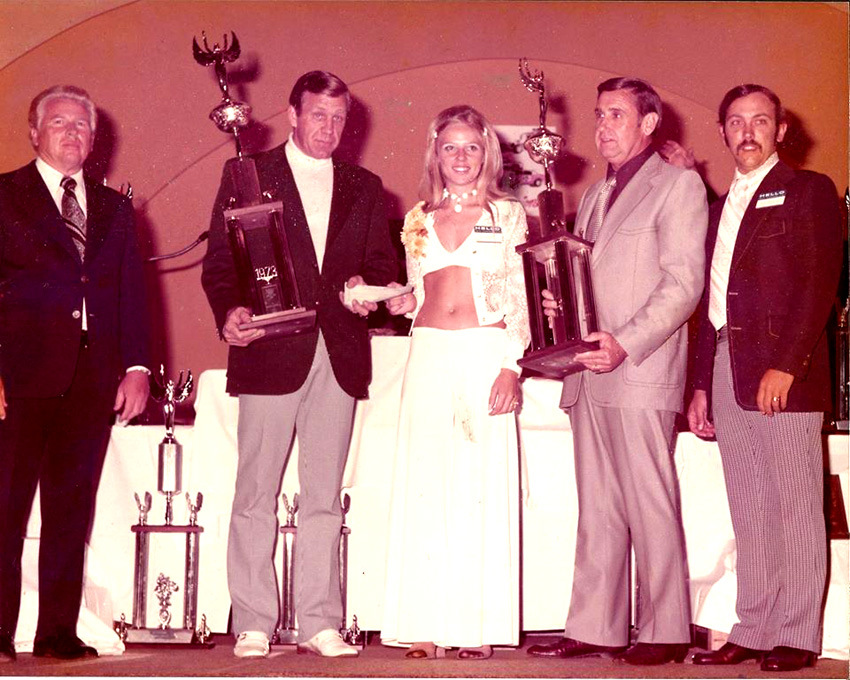
Harold
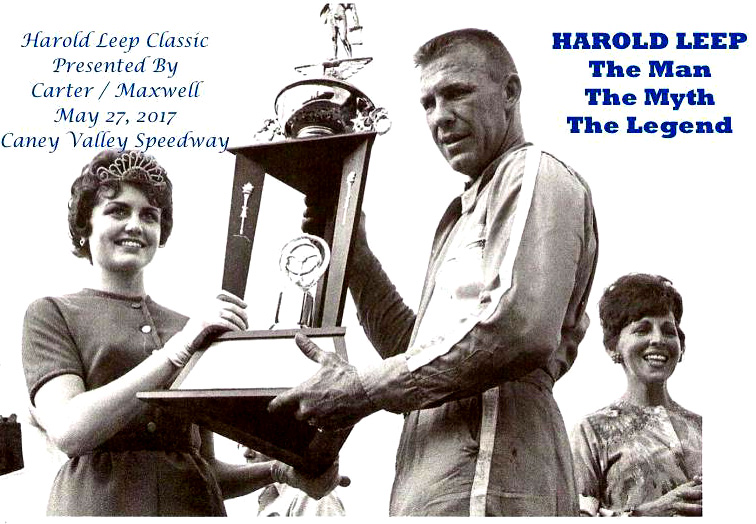
Harold's memorial race
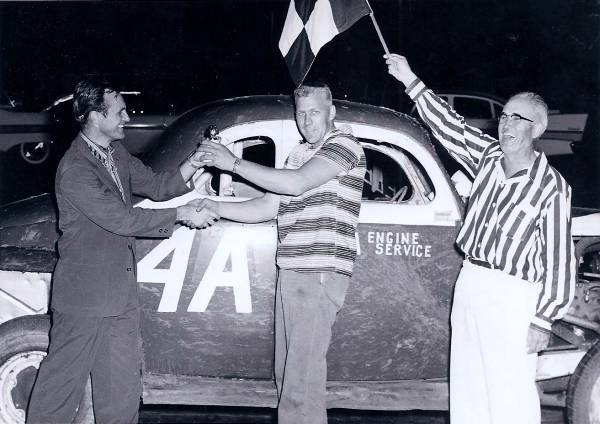
Harold with his old modified
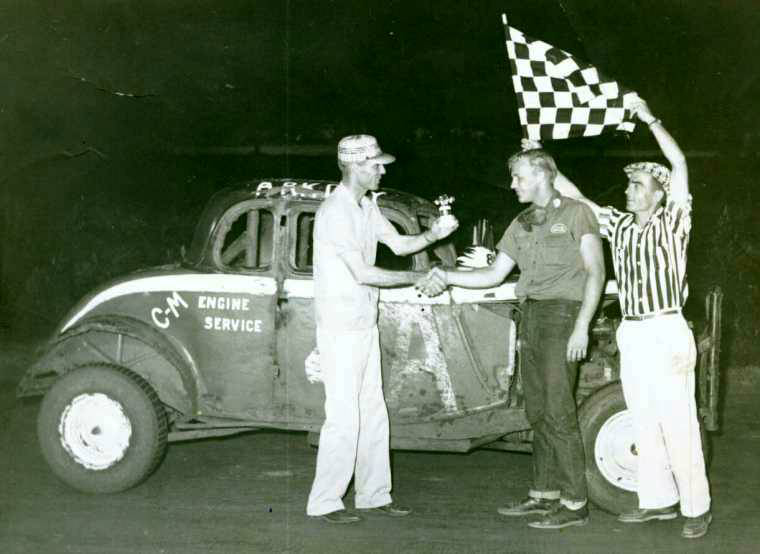
Harold getting small trophy
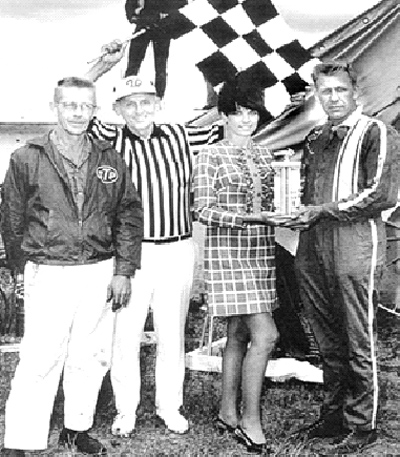
Harold with another trophy
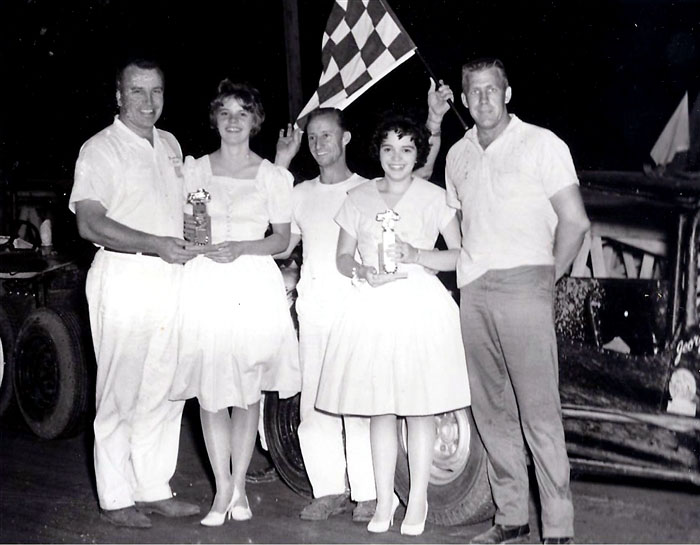
Harold and another trophy presentation
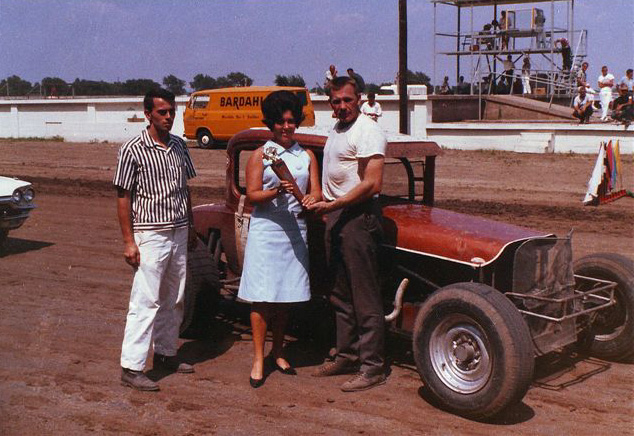
Harold getting a trophy

Harold winning 1972 NCRA event
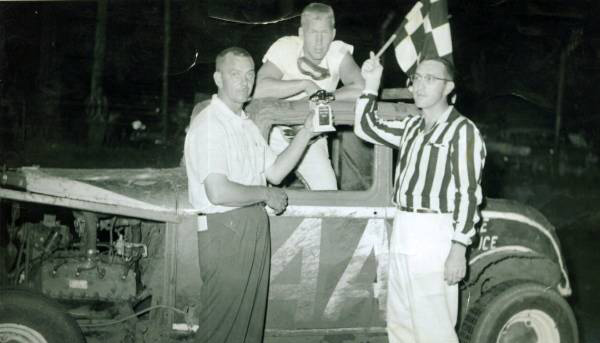
# 4

Harold with # 52
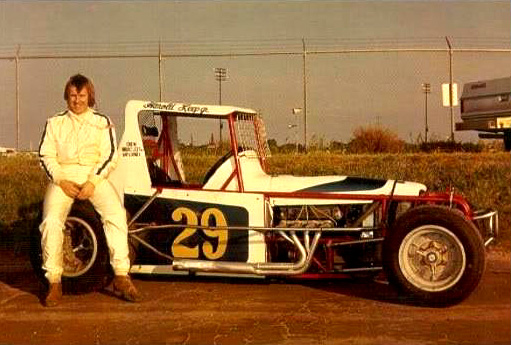
# 29
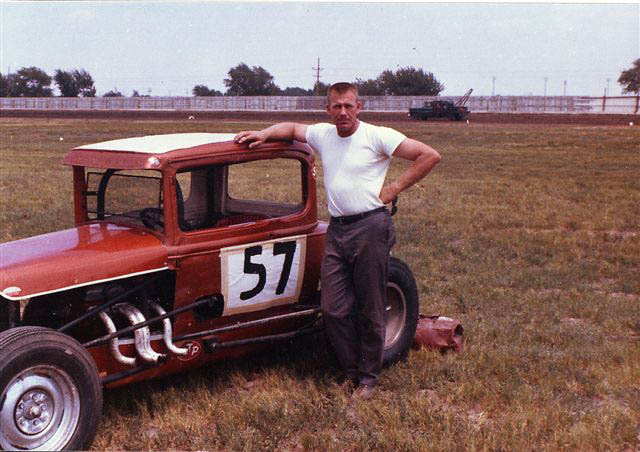
Harold with # 57
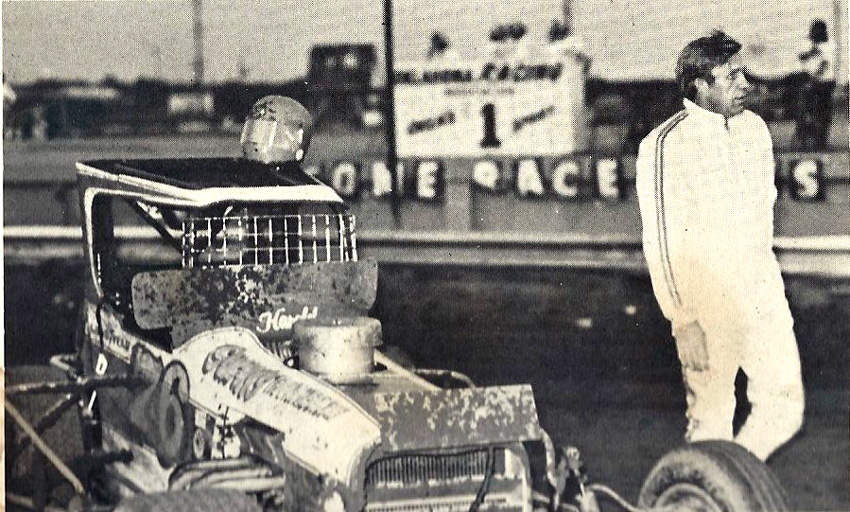
# 76
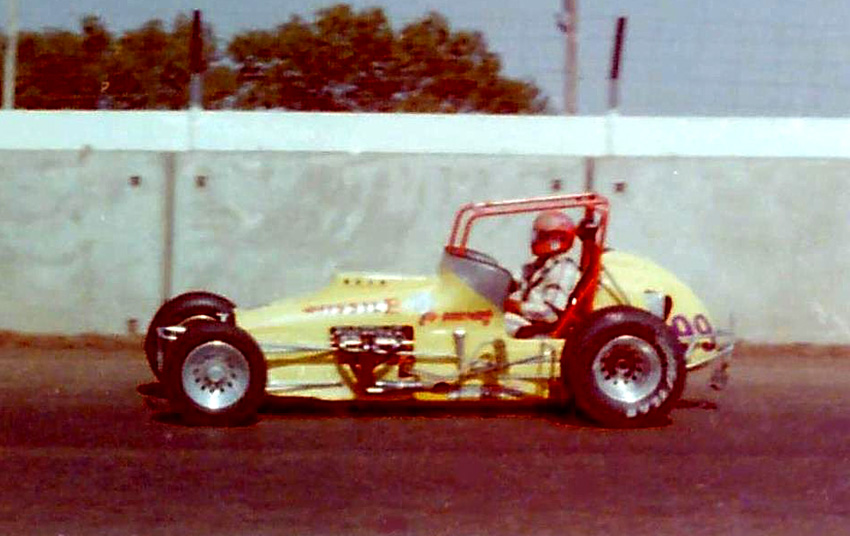
# 99
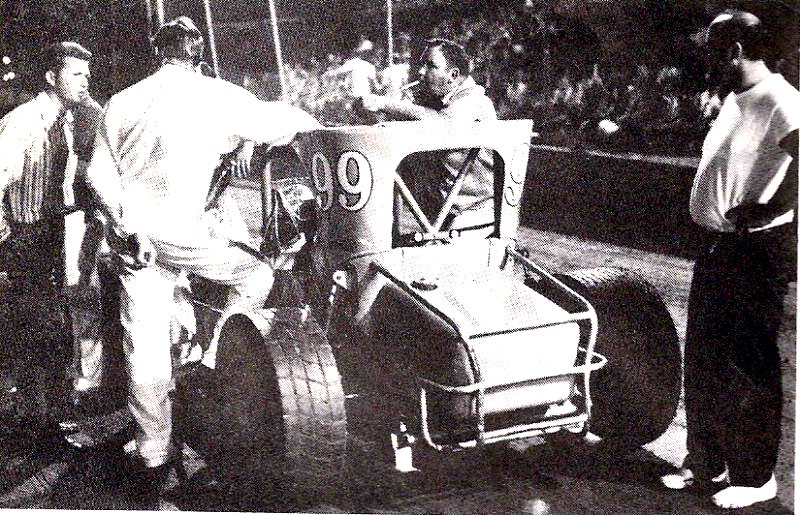
# 99
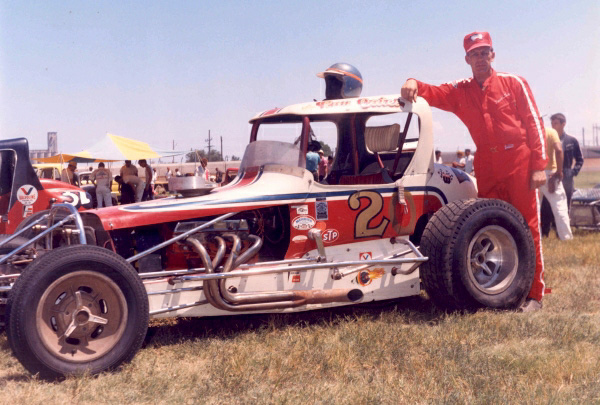
# 2
# 4
Harold getting out of the car
# 25
# 2
# 2
# 2
# 11
# 11
# 29
# 32 jalopy
# 76
# 99
# 99
# 999
Harold with an old jalopy
Harold with # 25 before getting racy
Harold accepts the trophy from Al Sweeney
Harold and Chet Wilson with Mighty Mouse car
Harold
# 76
# 76
# 2
# 2
# 2
# 4 at Milwaukee 1960
# 25
# 25
# 52
# 57
# 76
# 99
# 99
# 999
Harold in # 25 in 1958
Harold in # 2
Harold in # 25 the "Offy Killer"
Harold in # 99 JD Porter car
Harold # 2
Harold revisiting a car called Mighty Mousse
Harold in # 25 with Car builder Chet Wilson in 1957
Harold passing Bill Burdick in 1963
Harold and Shane Carson
Harold # 24 and Larry Holman
# 2 Ray Cates car
# 25
Harold outside of Jerry stone
Harold in # 24 at Okie City 1975
# 76 and # 45 hererra
# 76 against his son Harold Jr in # 29
# 76 left with Johnny Suggs at Amarillo
# 70
# 99
# 2x
# 70 right
# 44
# 70 Harold about to take a ride as the next pic shows
Harold was still in the seat, but was later all right
# 25
# 76 behind Jerry Stone
# 24
An early crash
# 2 racing Terry Doss
# 76 racing ahead of Frank Lies 1977
# 2 racing Walt McWhorter
# 99 against Ray Crawford
# 24 ahead of Larry Holman at Okie City 1975
# 25 leading # 89
# 52 chasing Johnny white in 1962
Harold's story
The Speed News
Tulsa Speedway News
Racing legend
Harold's many cars
# 2
# 2
# 2
# 11
# 76
# 99
# 01
# 2
# 2
# 5
# 5
# 07 in 1976
# 13
# 24
# 25
# 25
# 25 at the Minnesota Fairgrounds in 1958
# 43
# 70
# 70
# 76
# 76
# 76
# 76
# 76
# 76
The Hutcheson Nationals fire
The fire in Hutcheson, Kansas that destroyed a few cars
More flames and I never found the story to see what happened
Harold's car after the fire was out
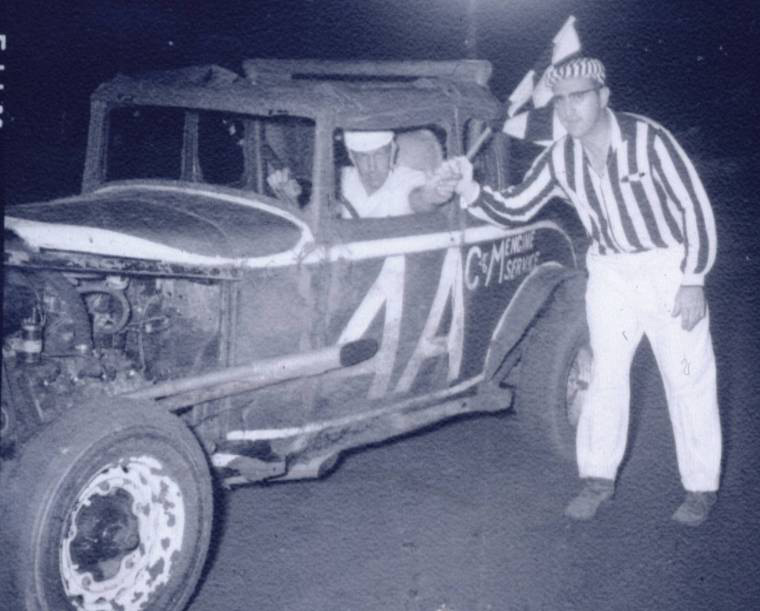
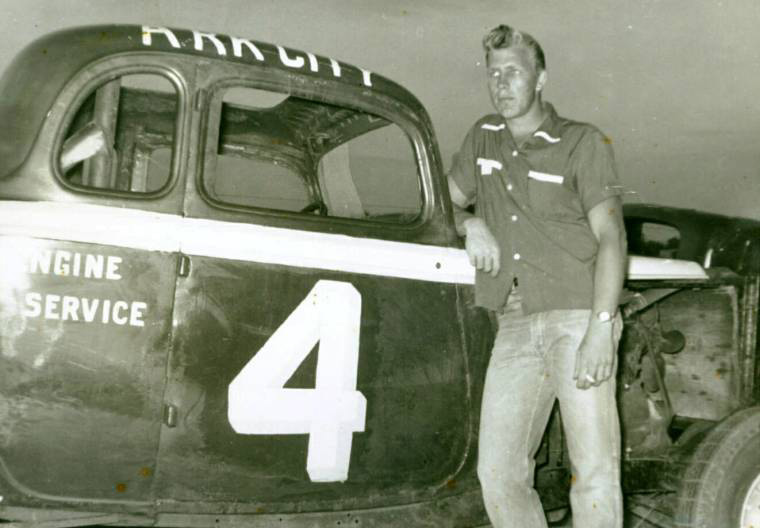
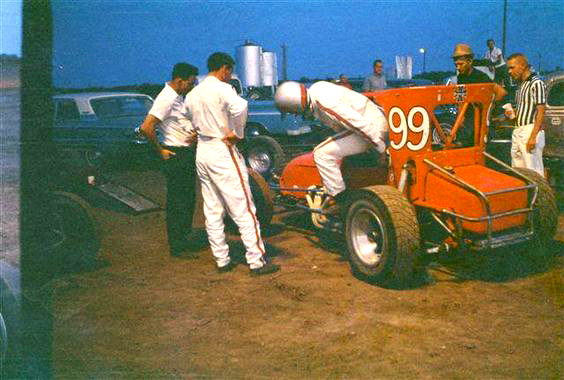
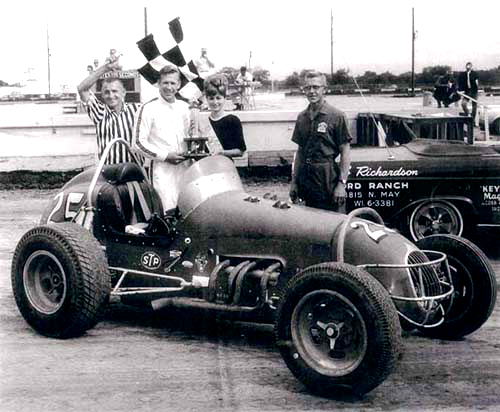
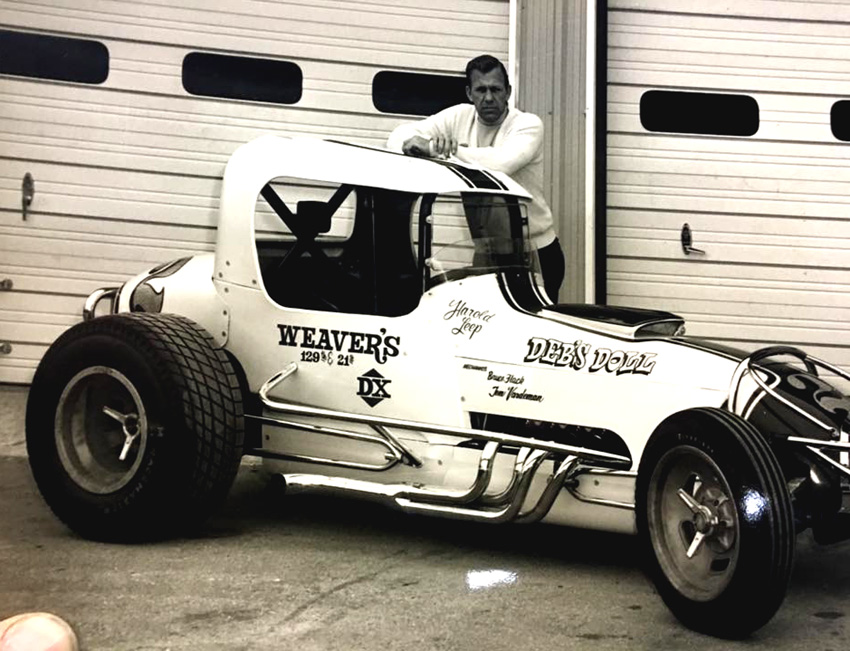
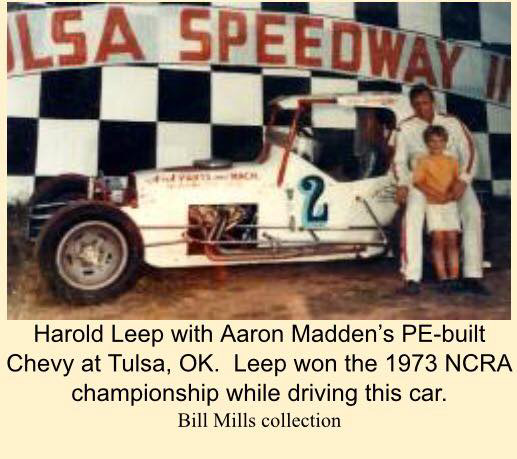
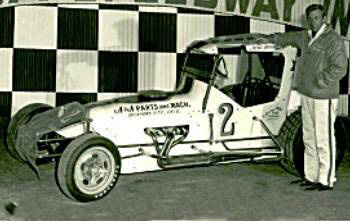
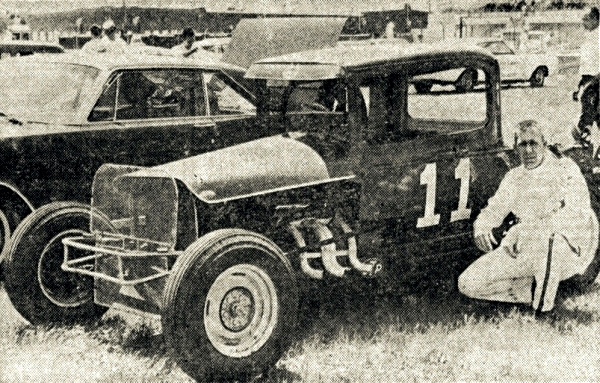
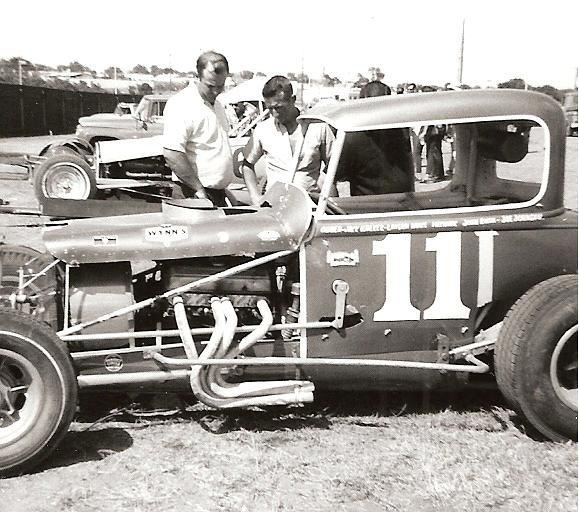
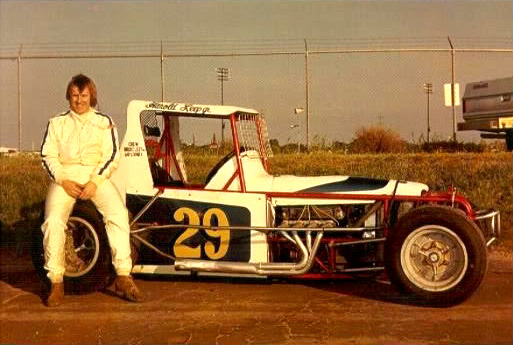
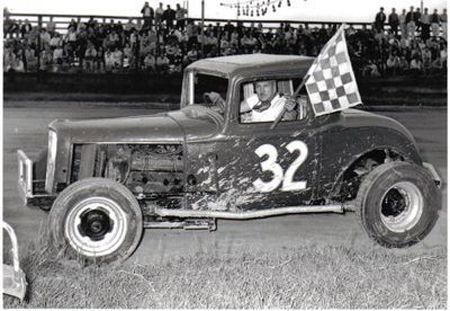
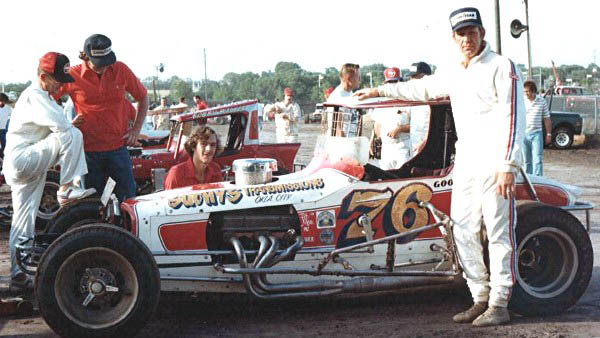
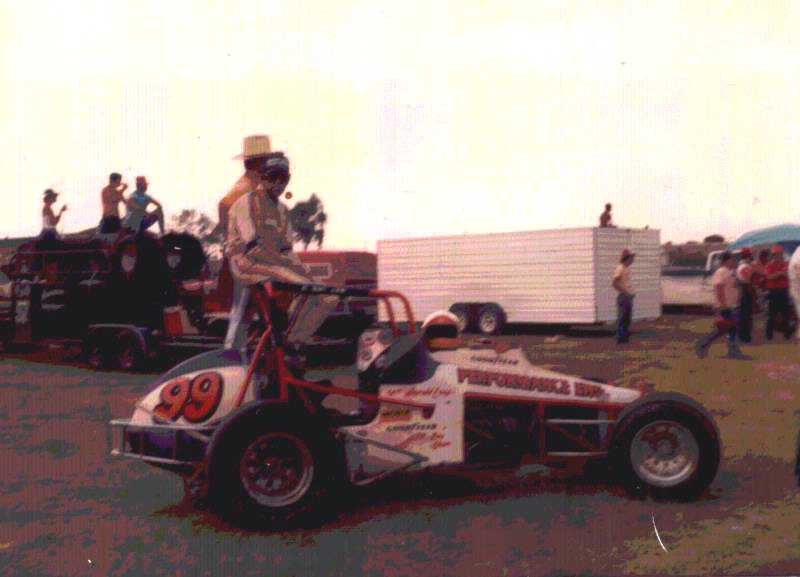
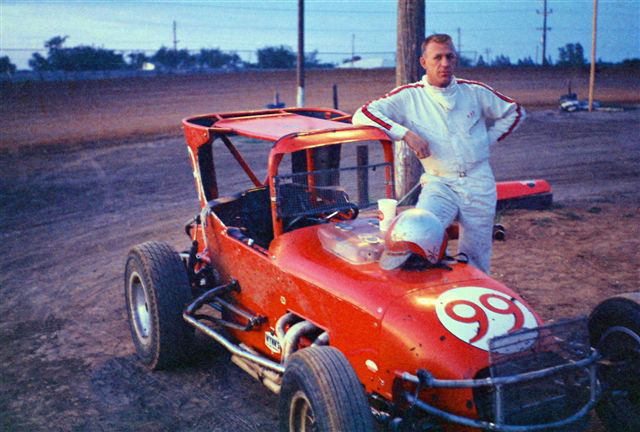
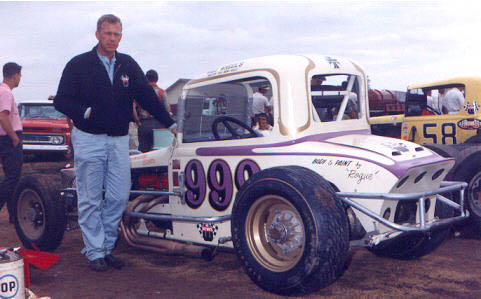
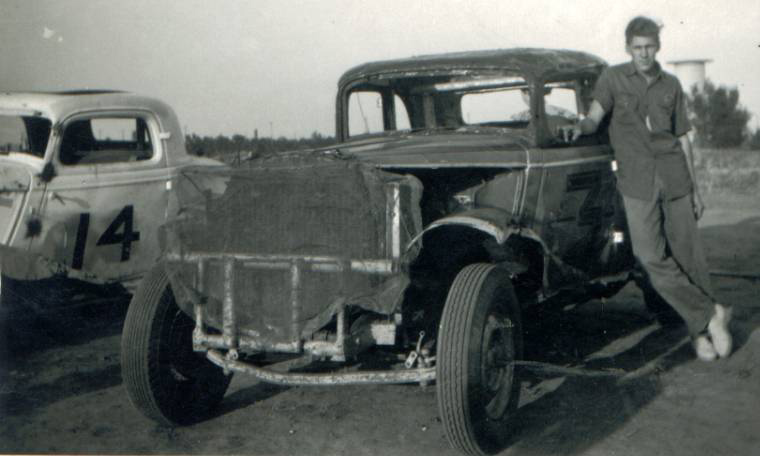
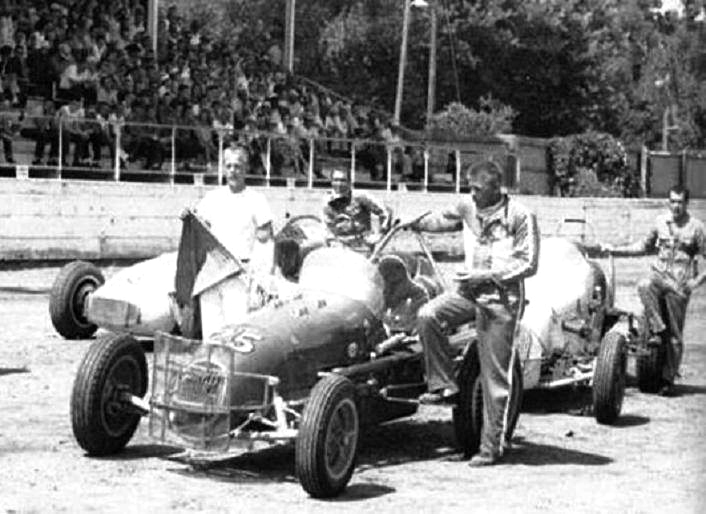
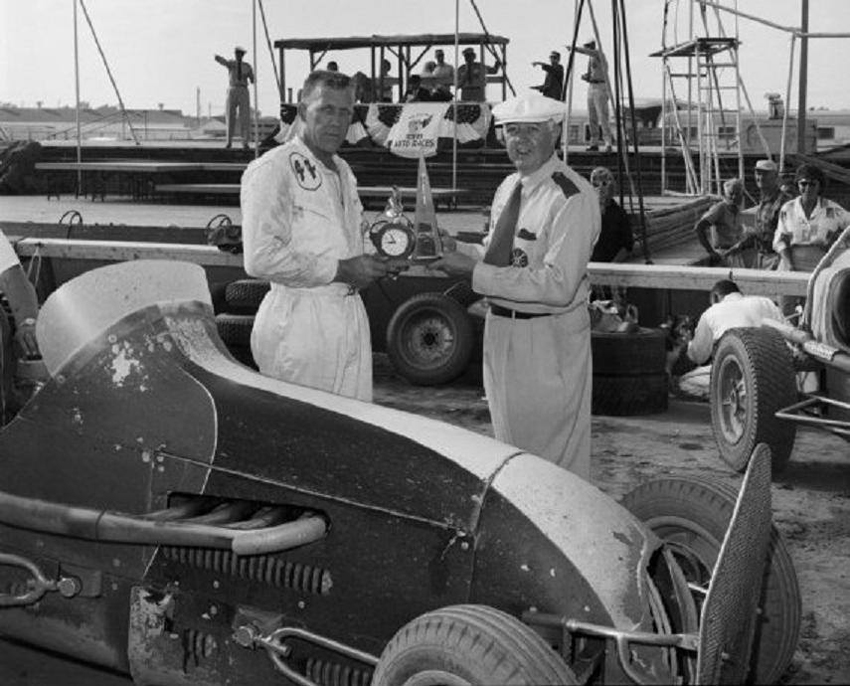
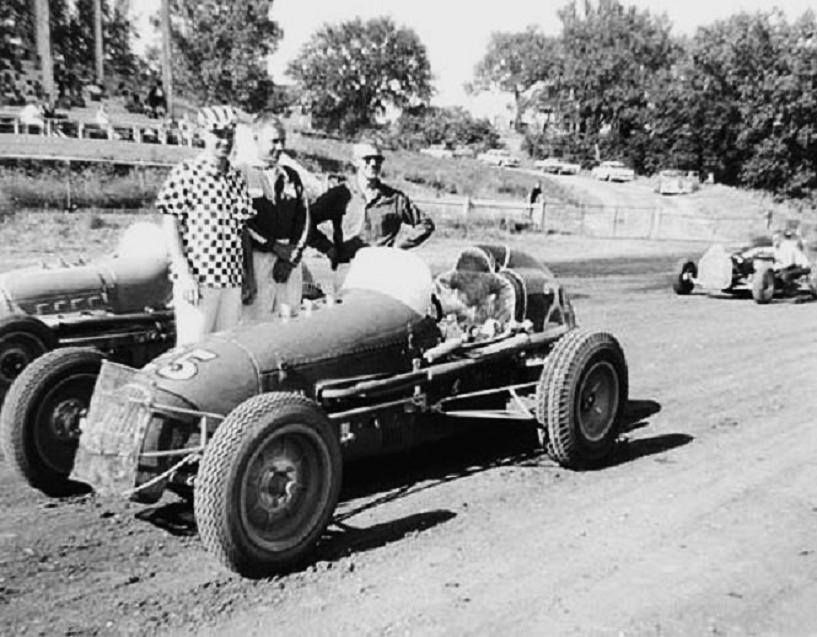
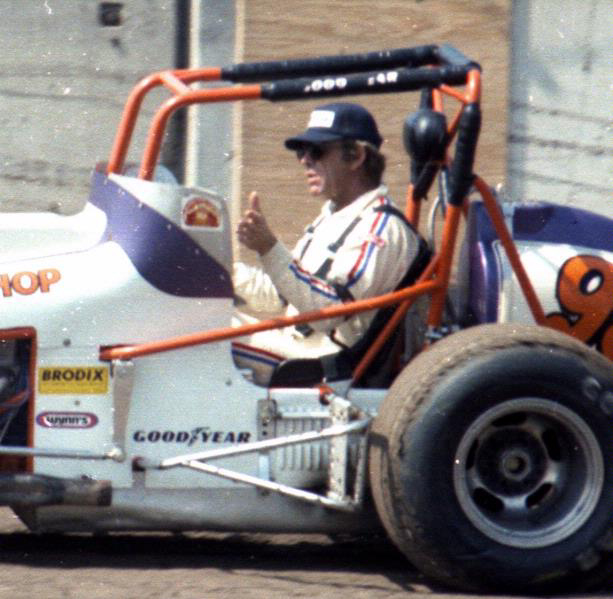
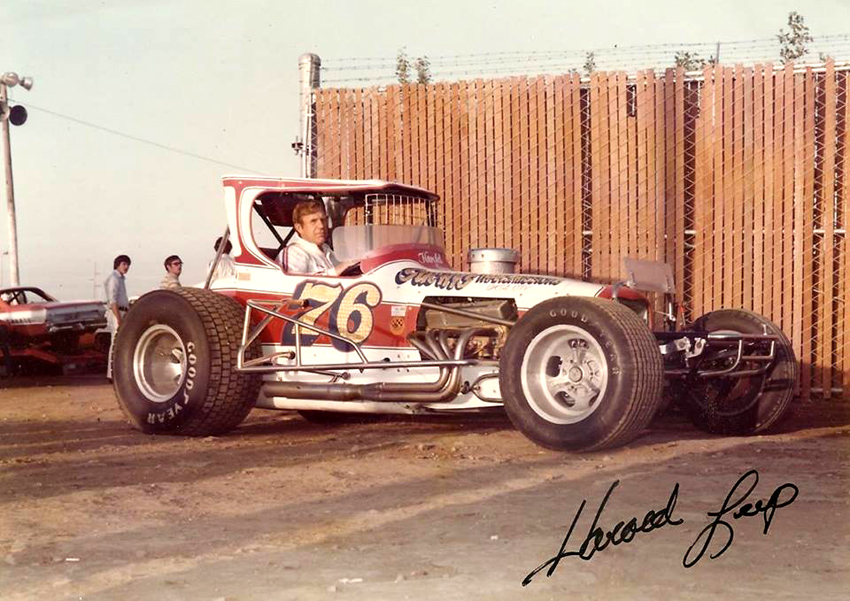
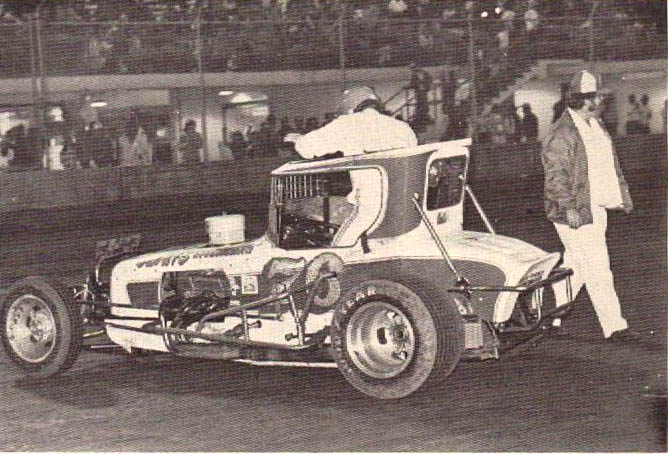
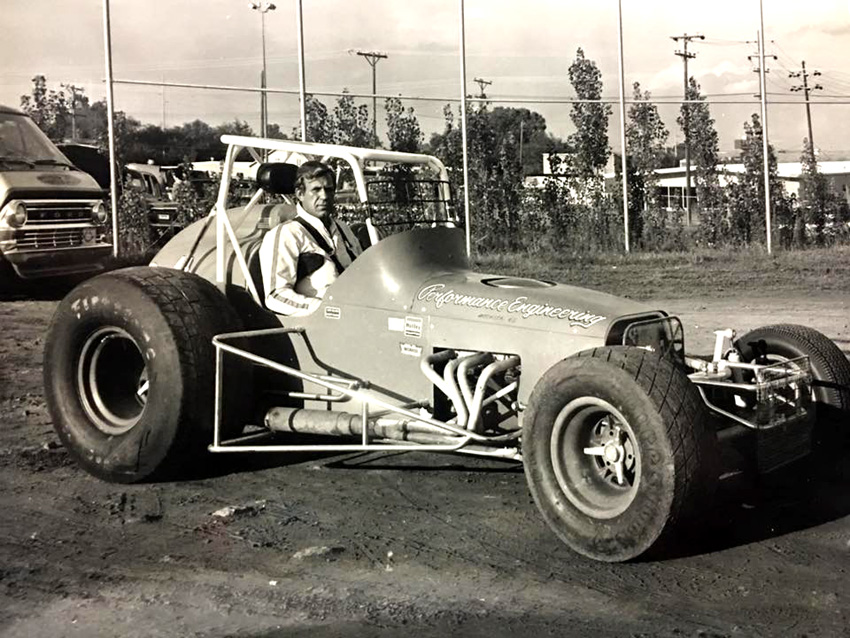
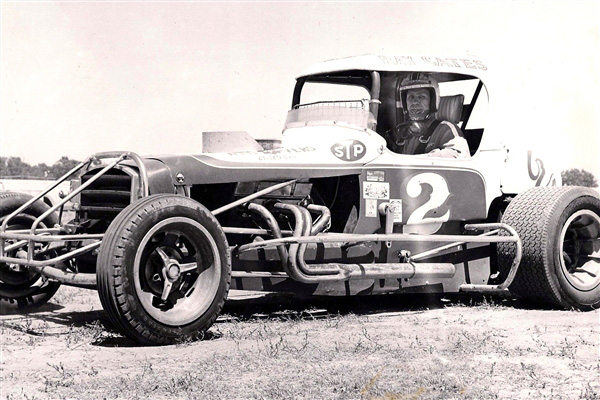
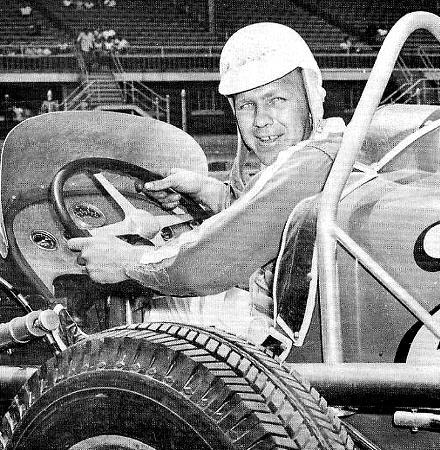
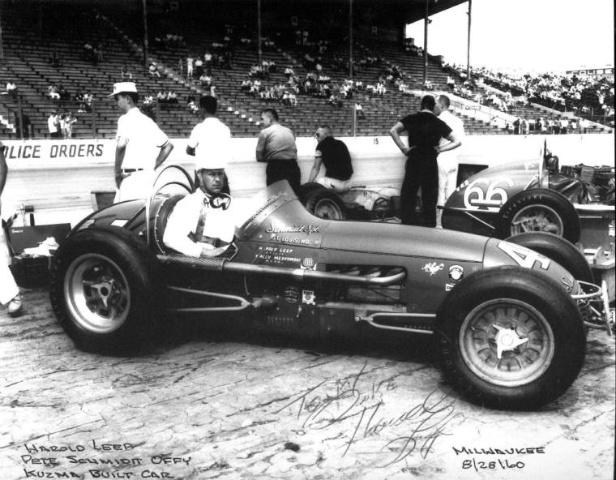
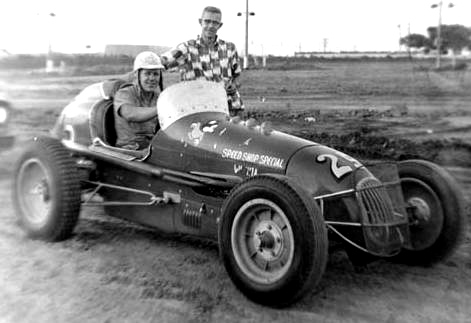
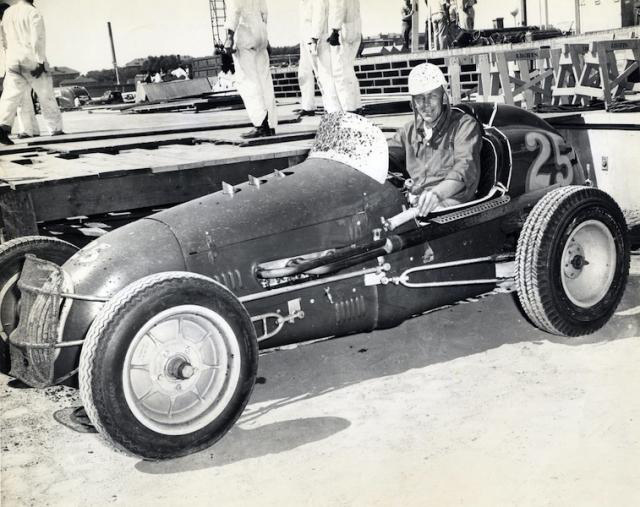
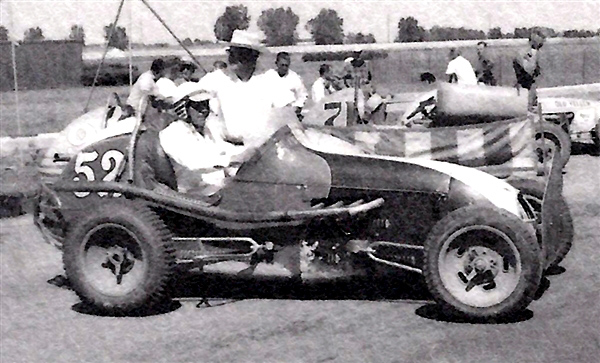
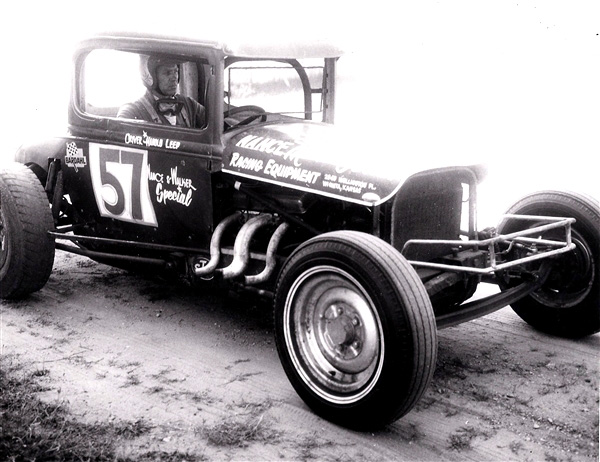
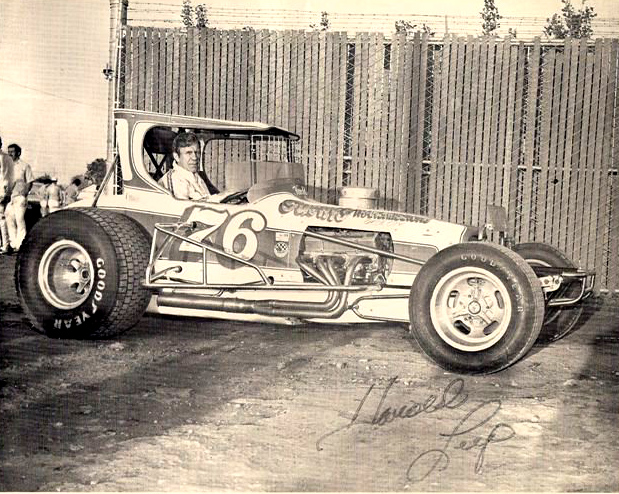
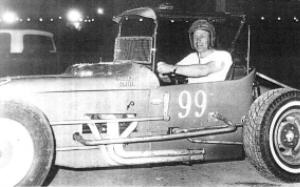
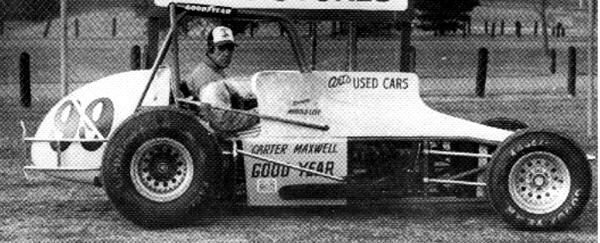
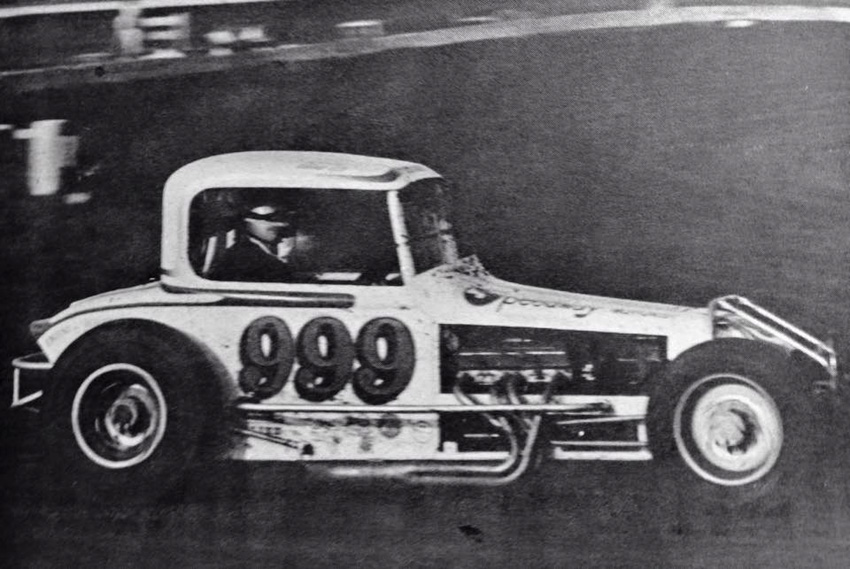
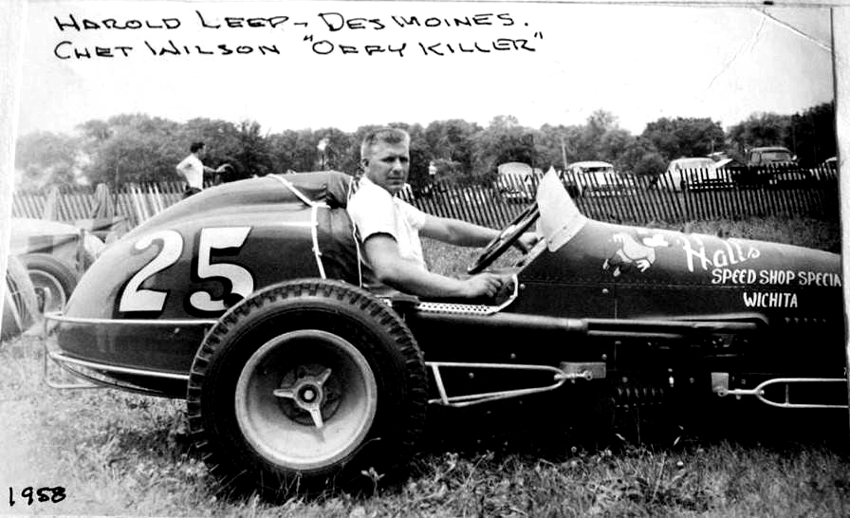
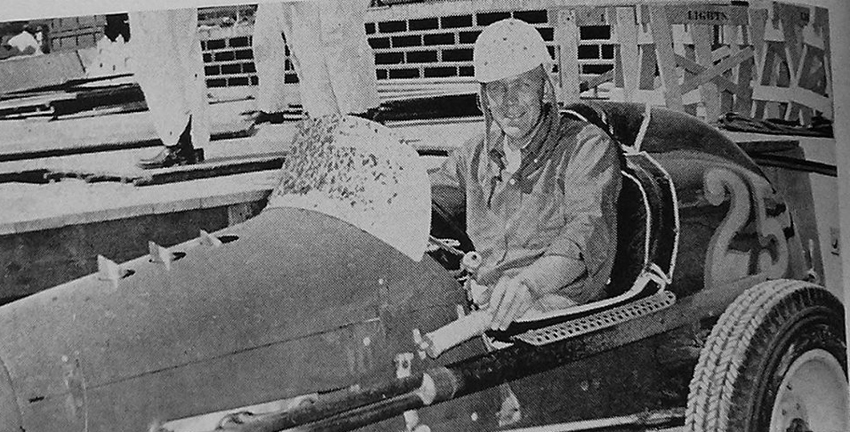
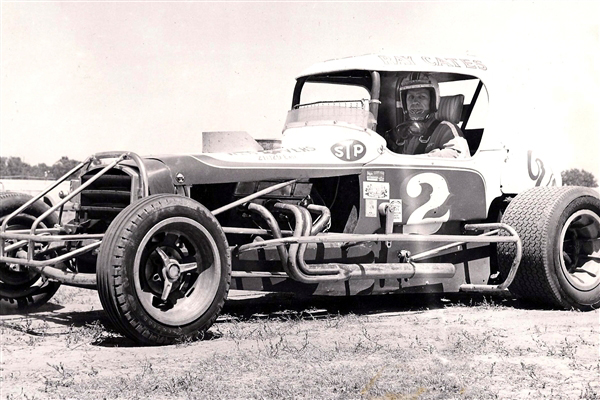
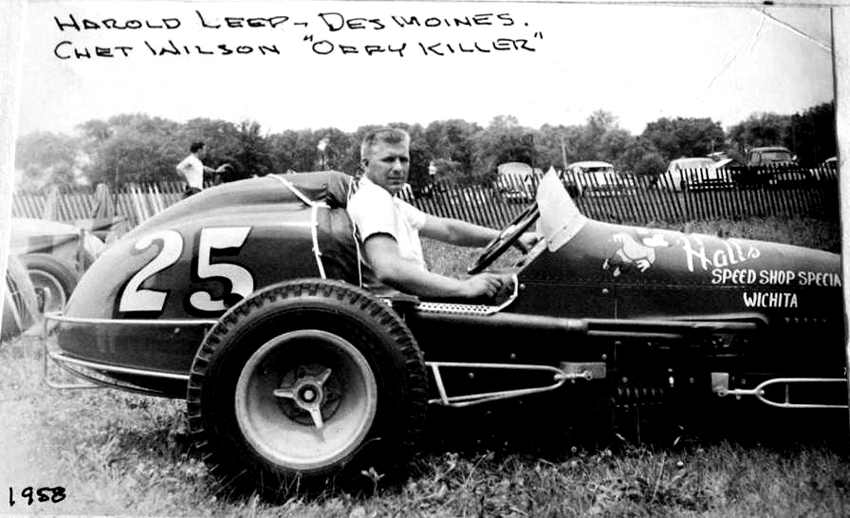
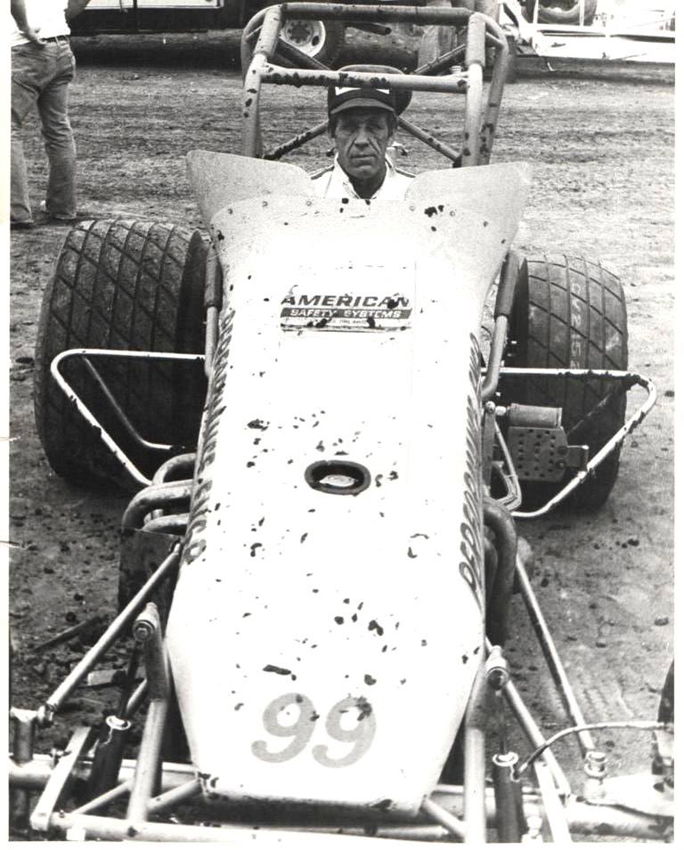
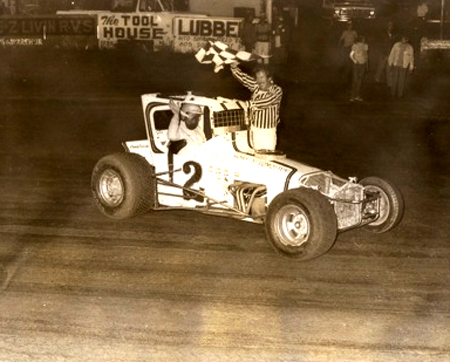
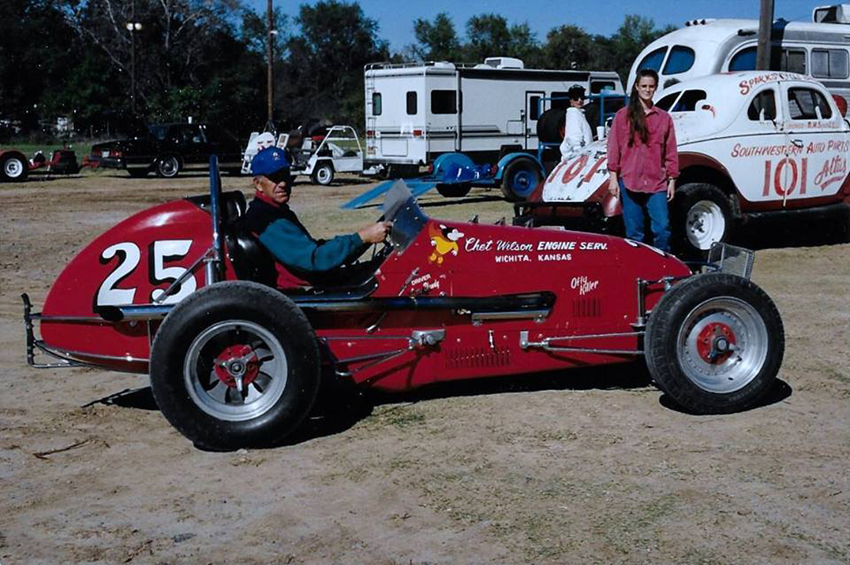
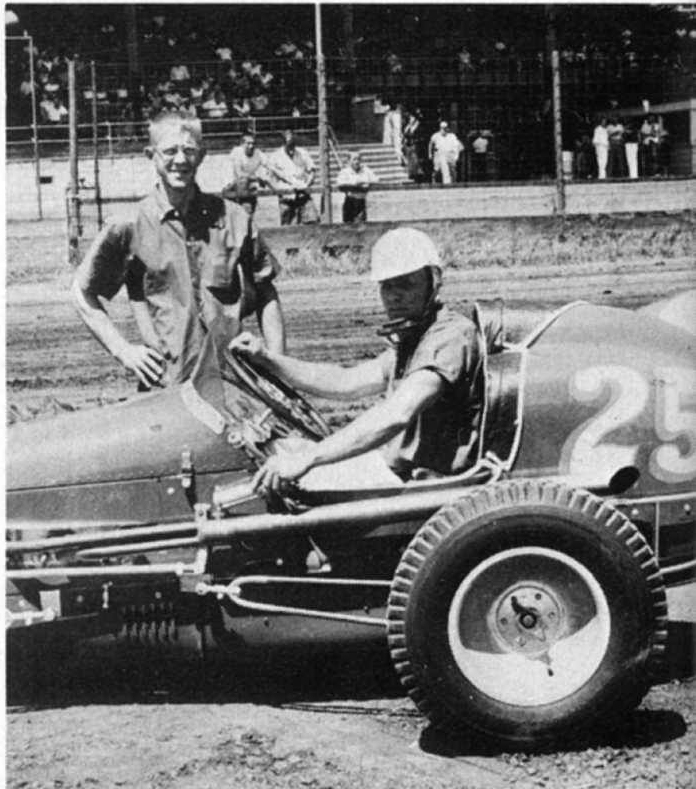
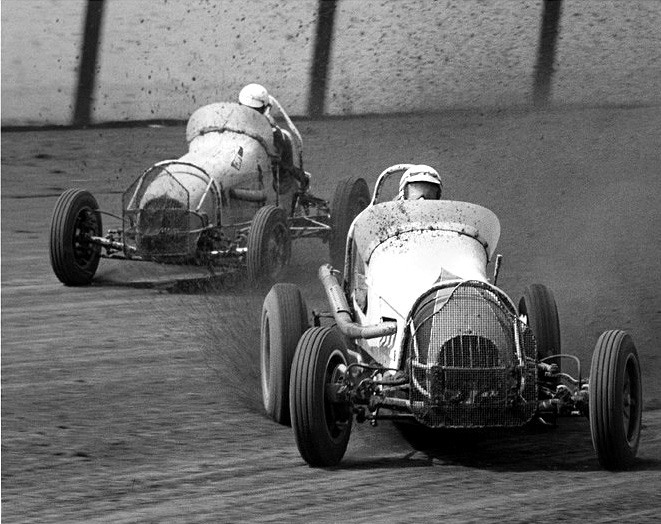
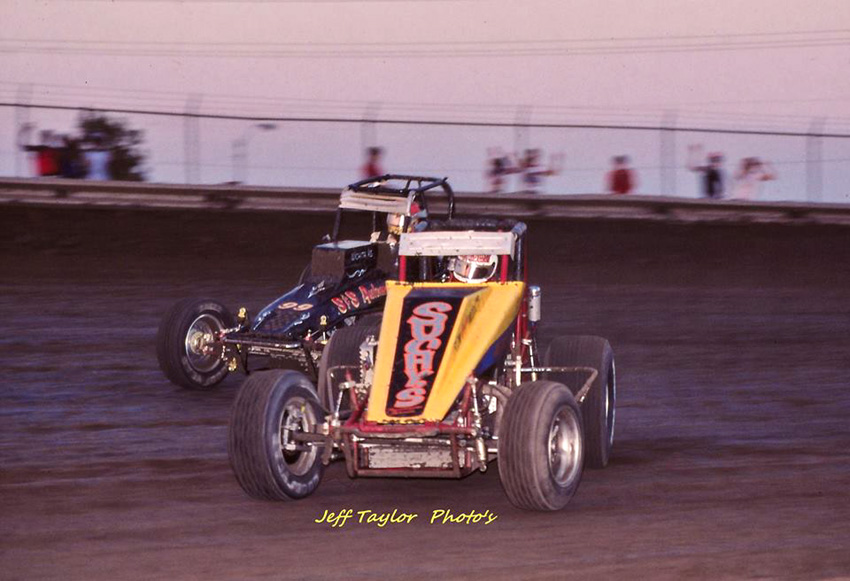
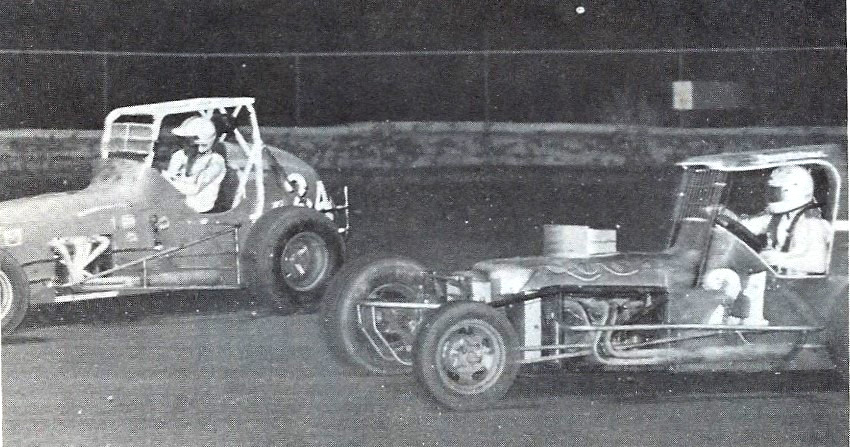
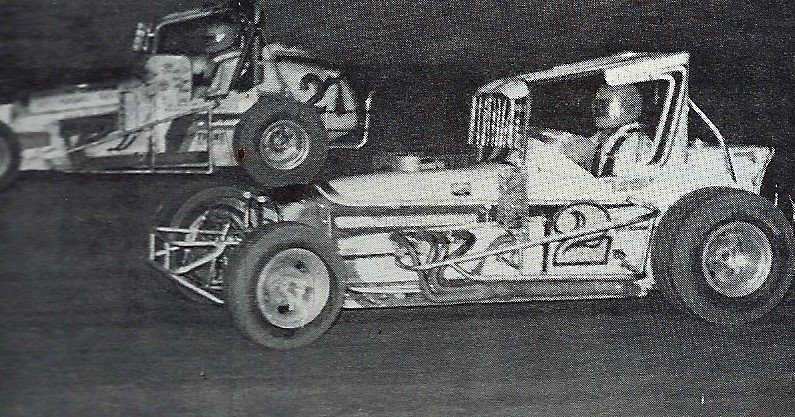
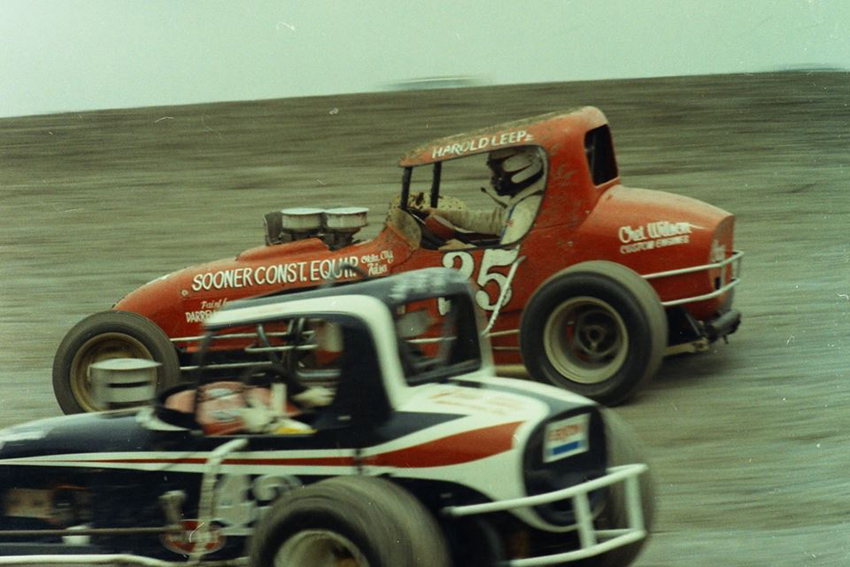
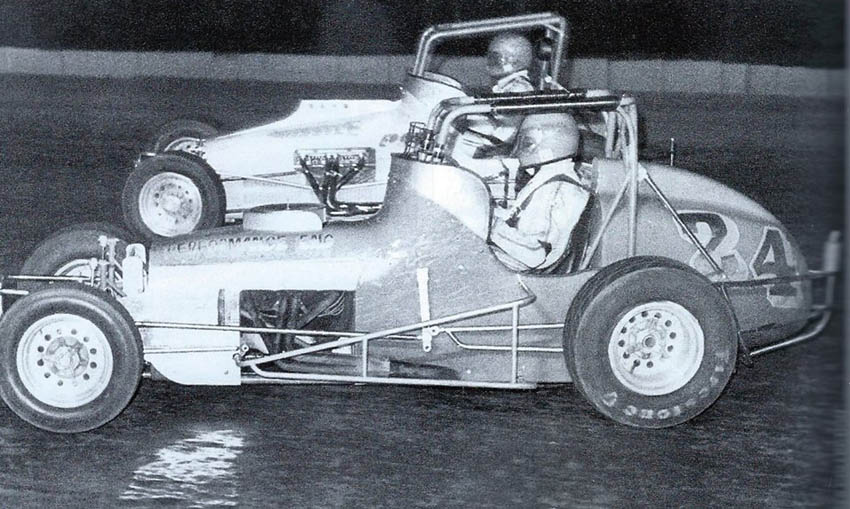
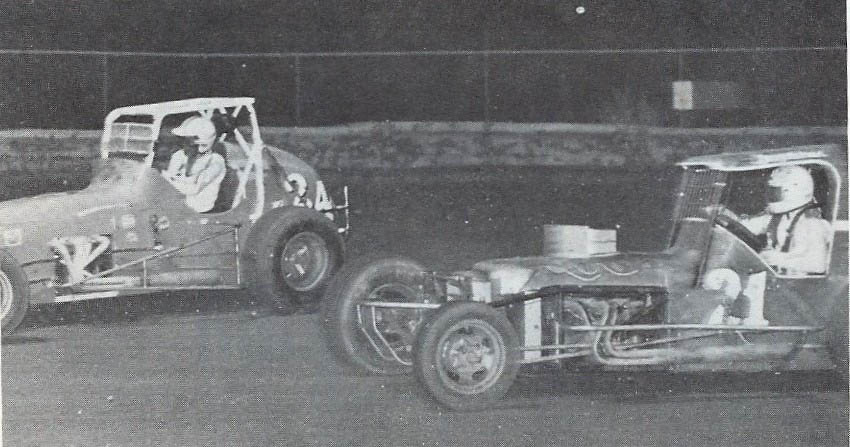
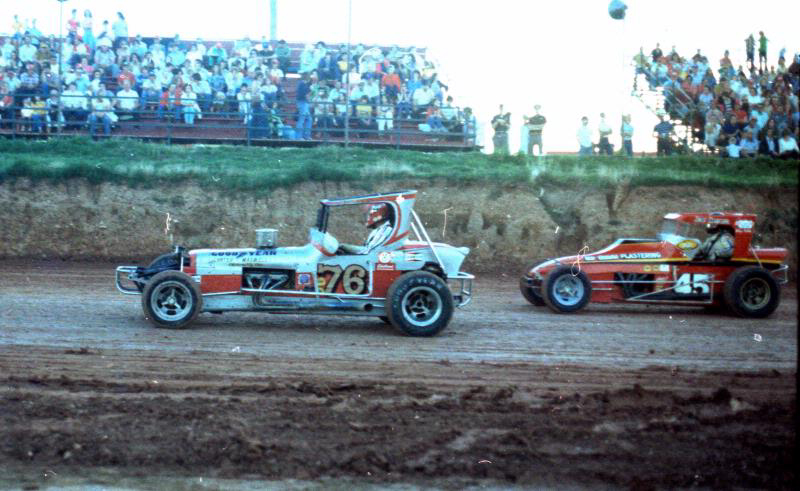

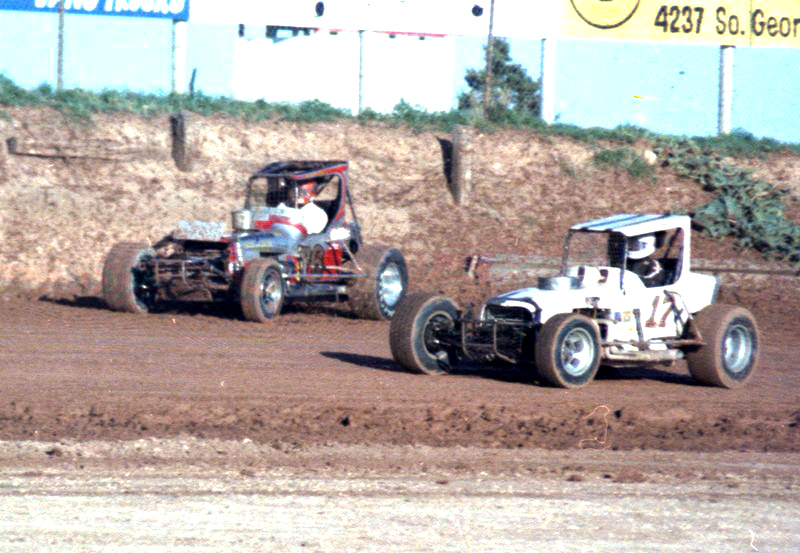
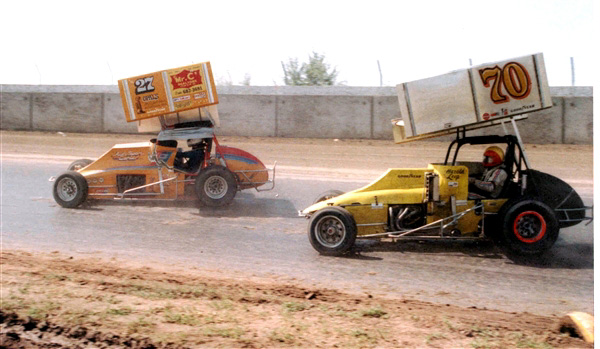
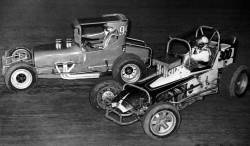
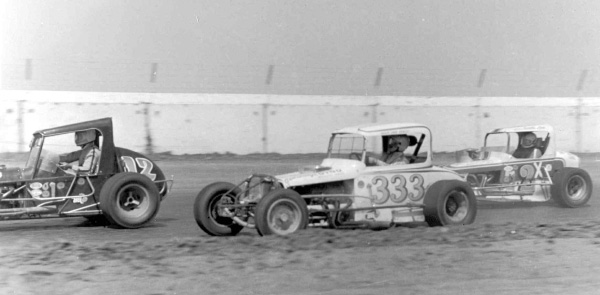
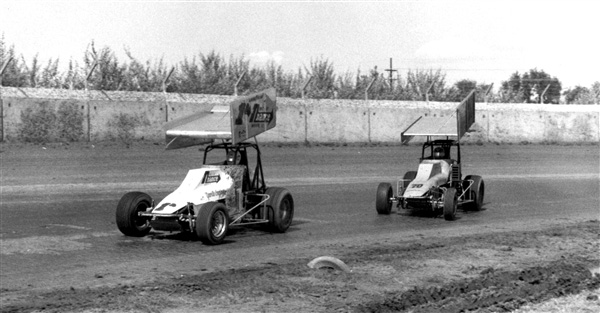
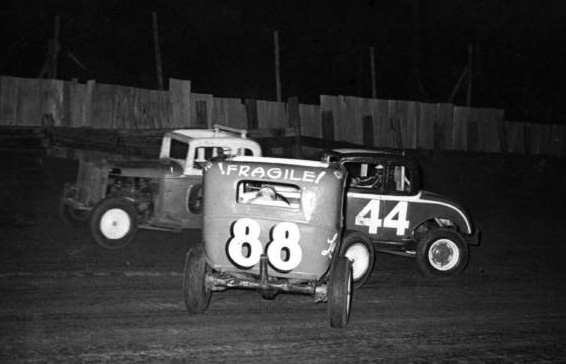
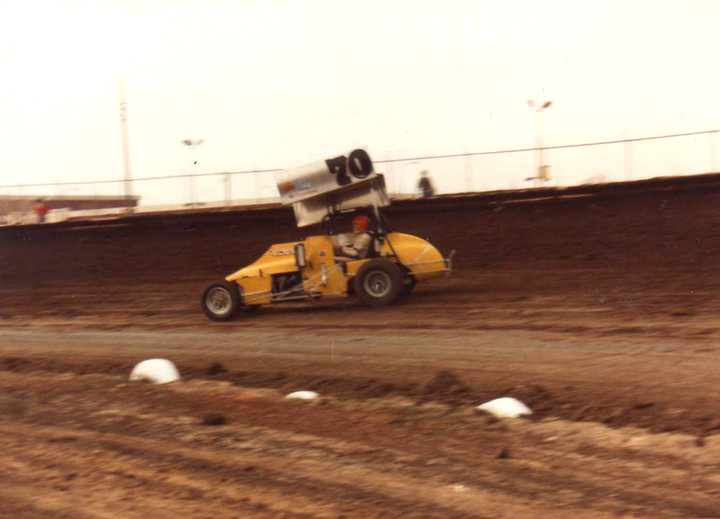
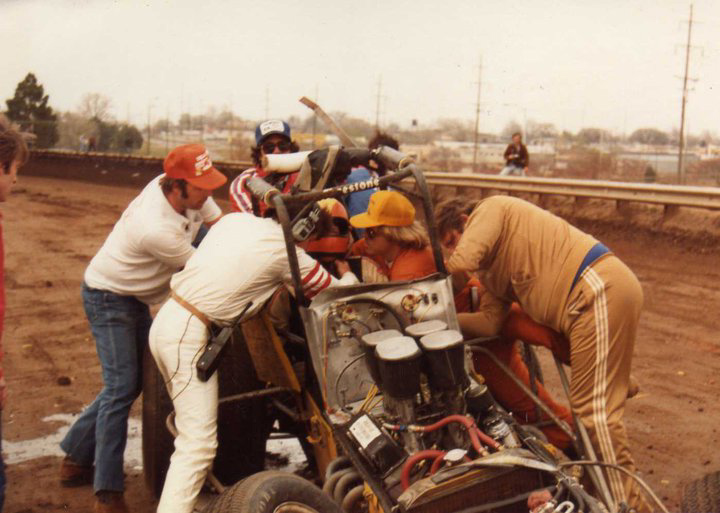
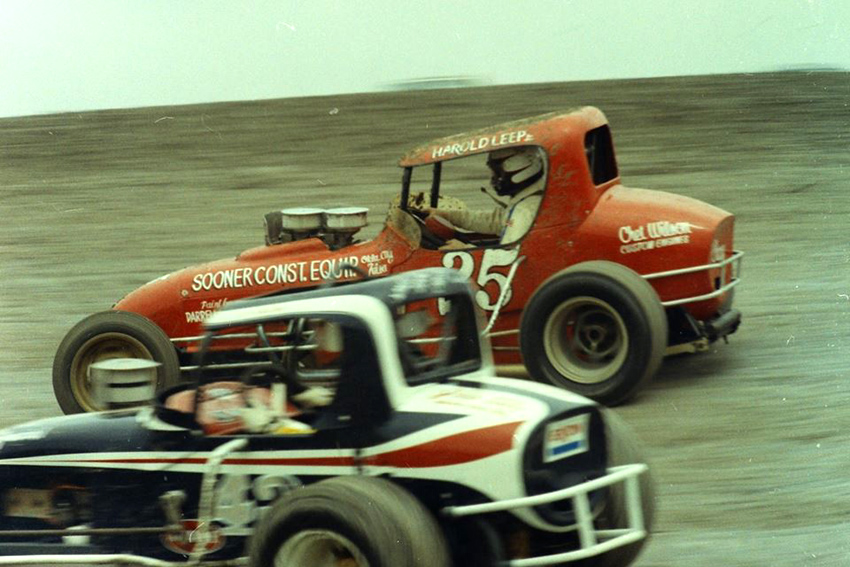
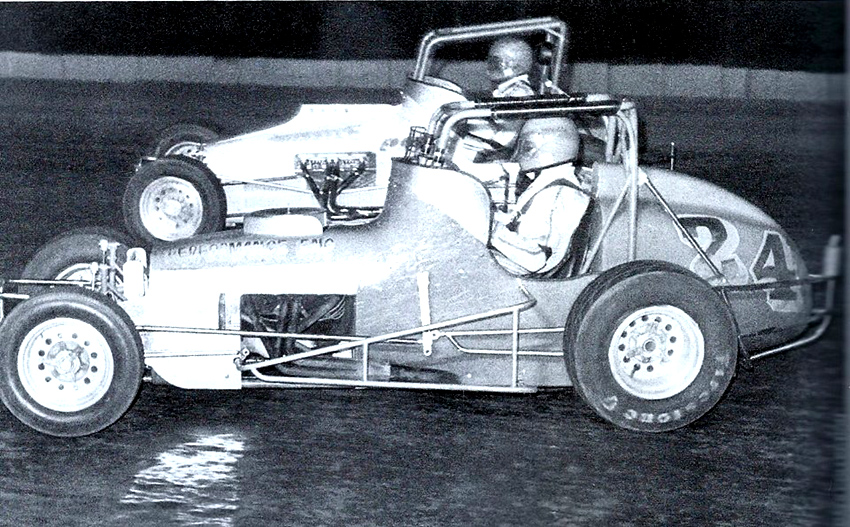
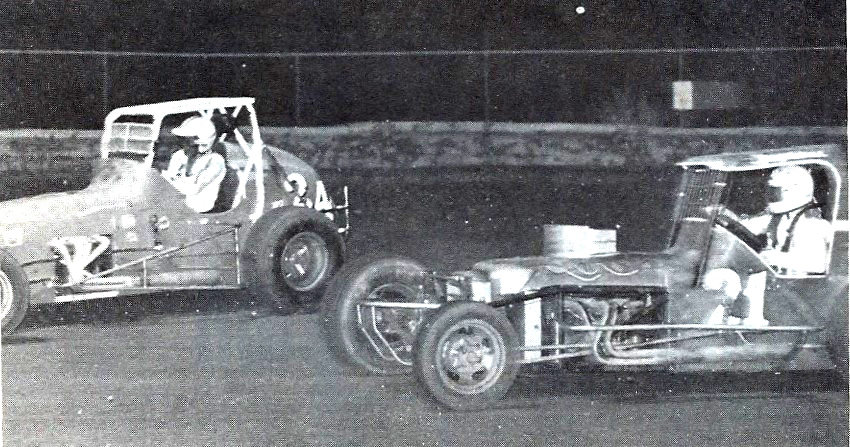
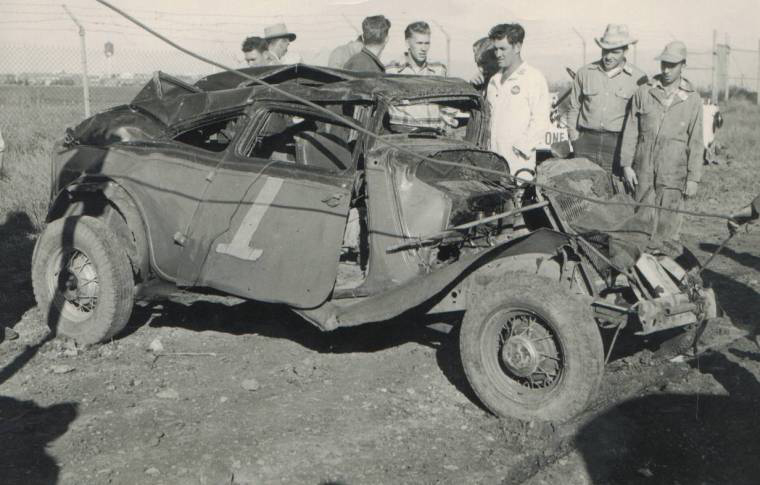
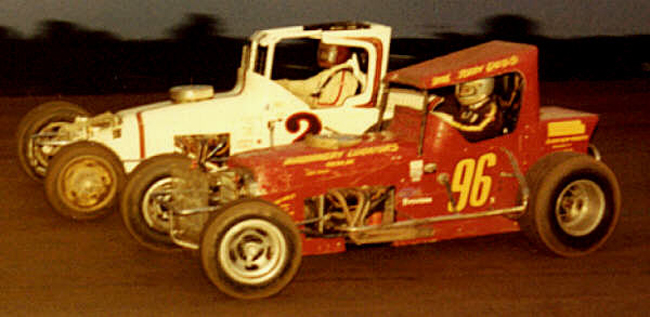
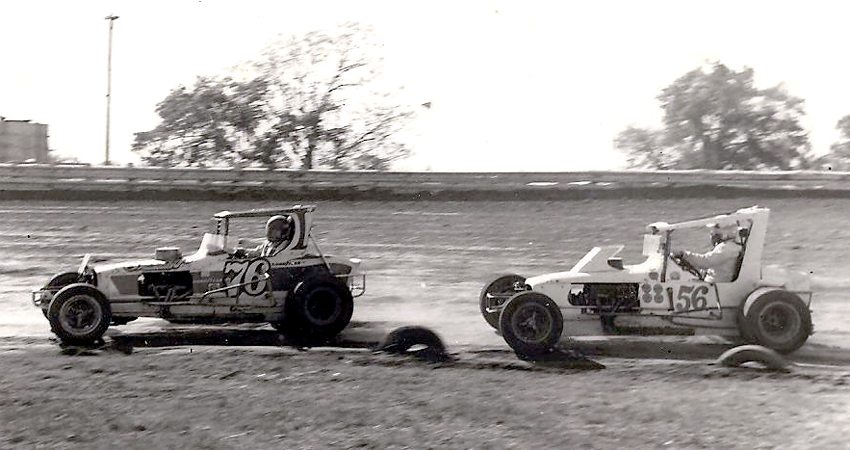
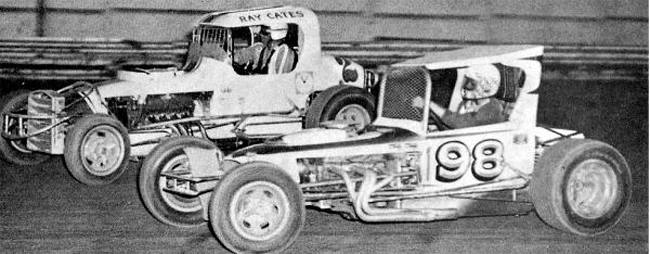
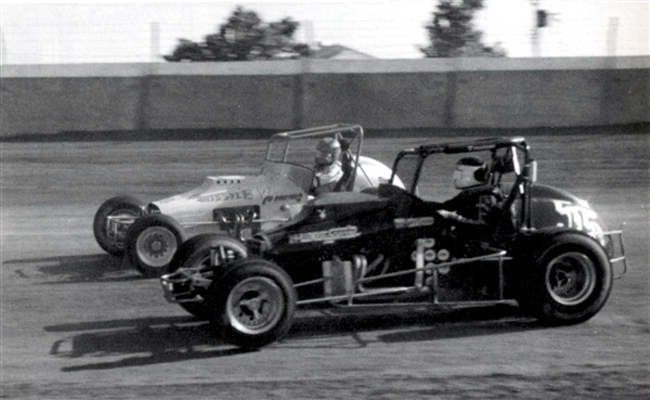
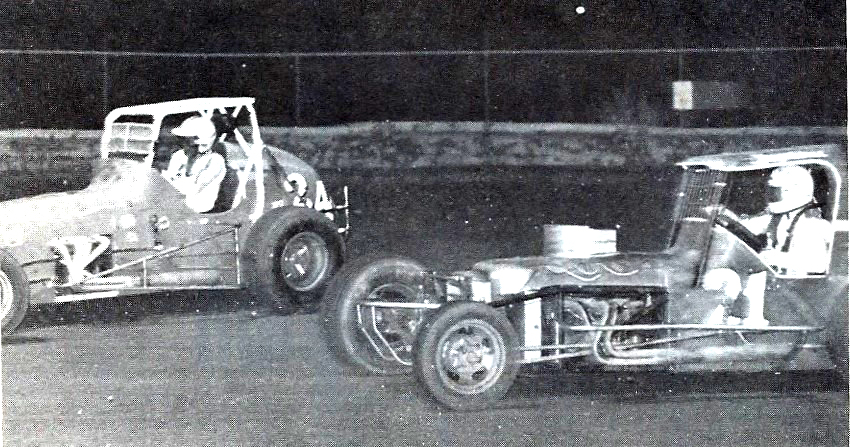
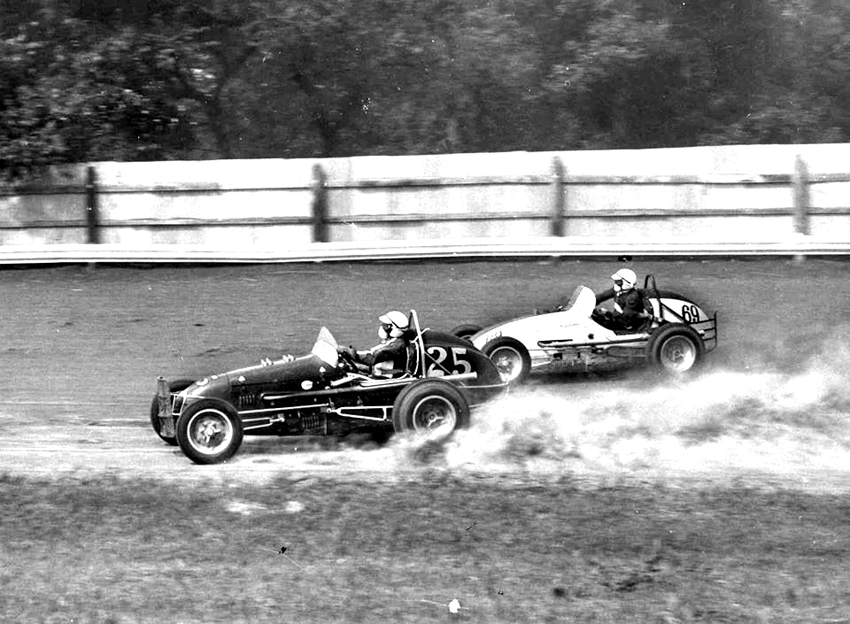
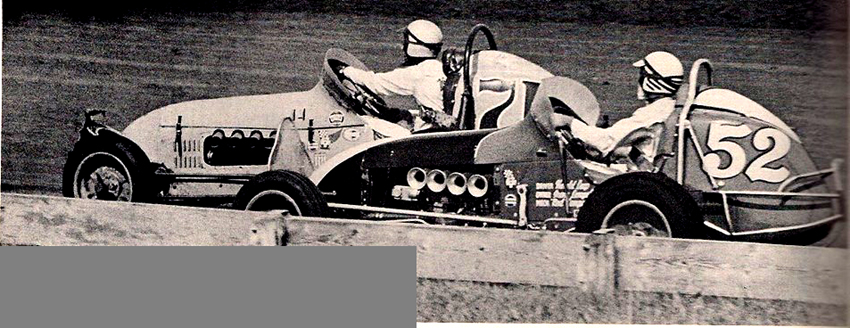
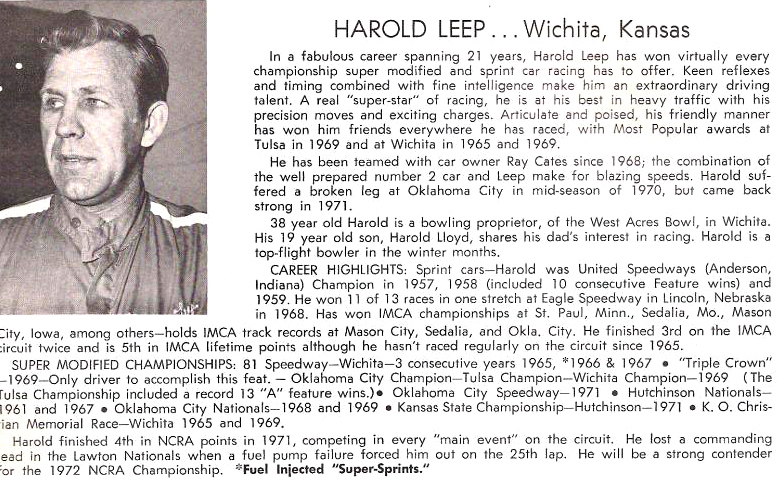
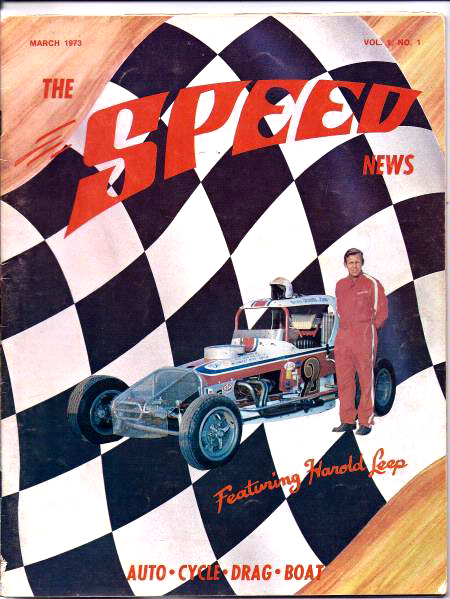
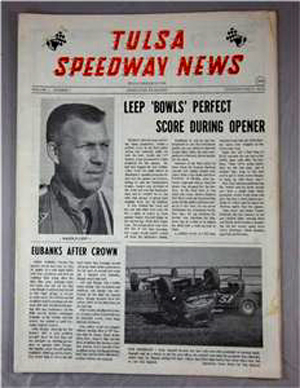
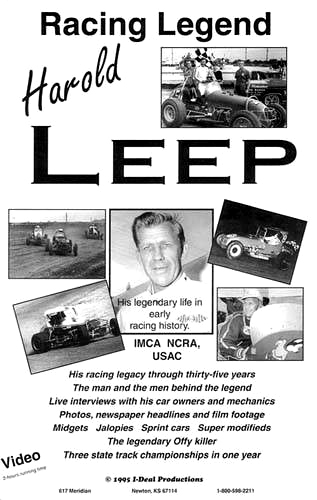
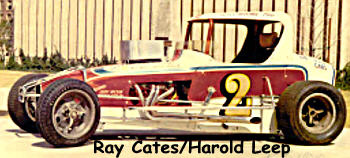
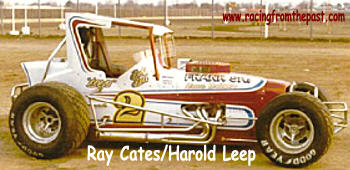
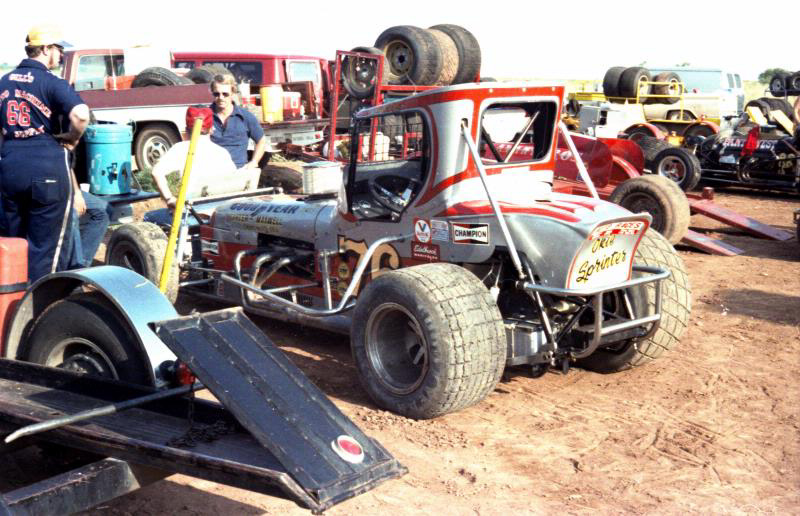
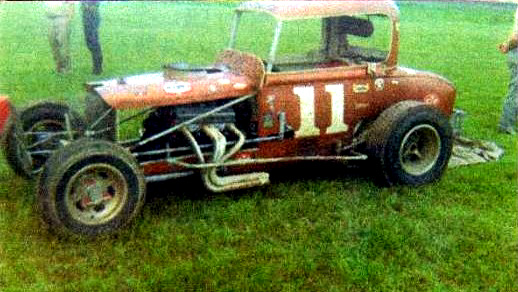
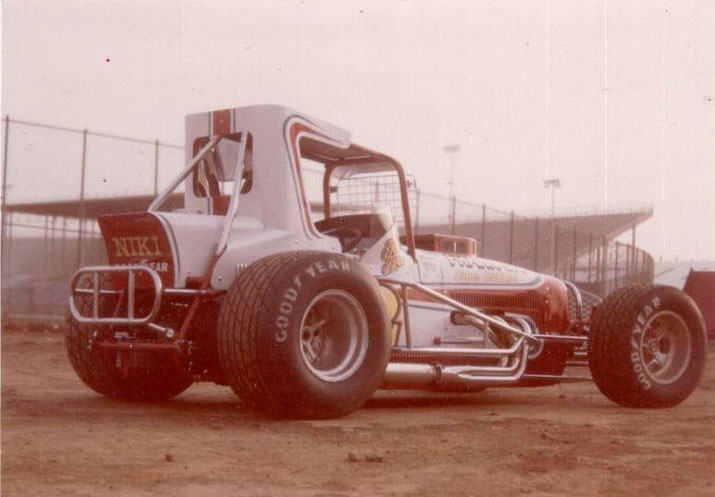
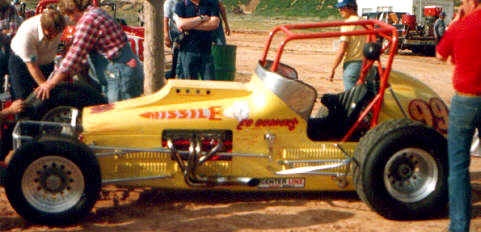
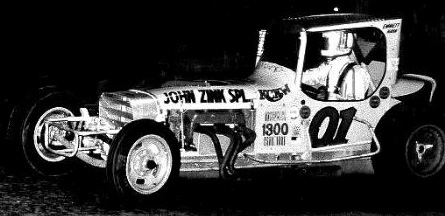
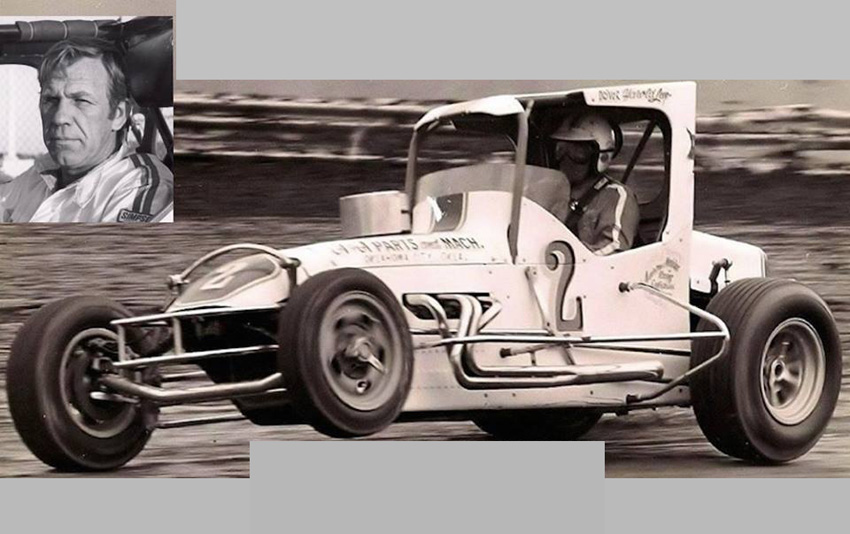
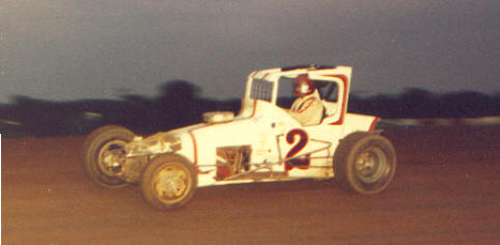
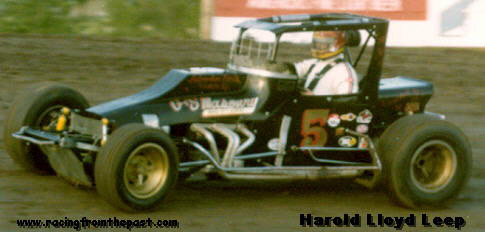
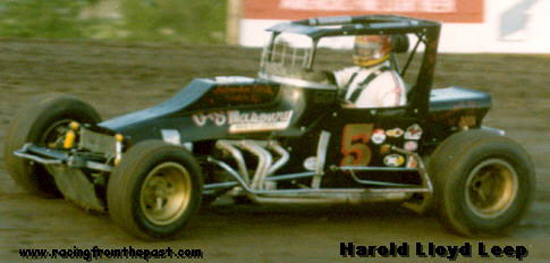
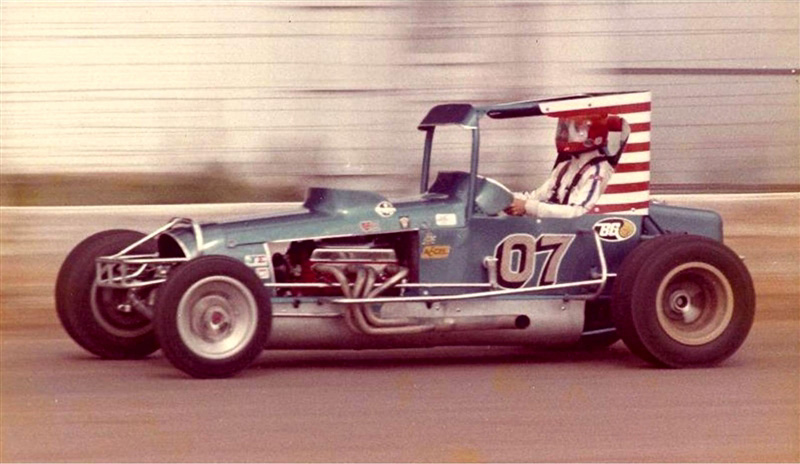
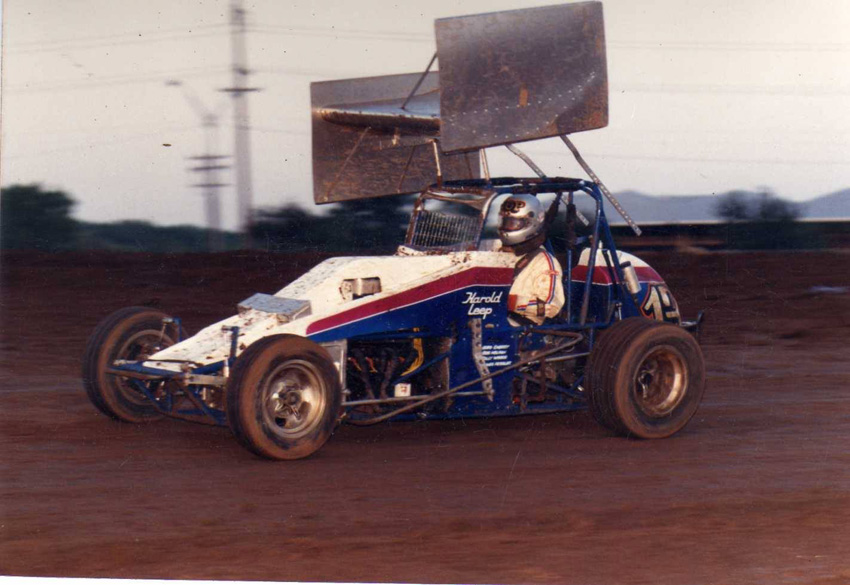
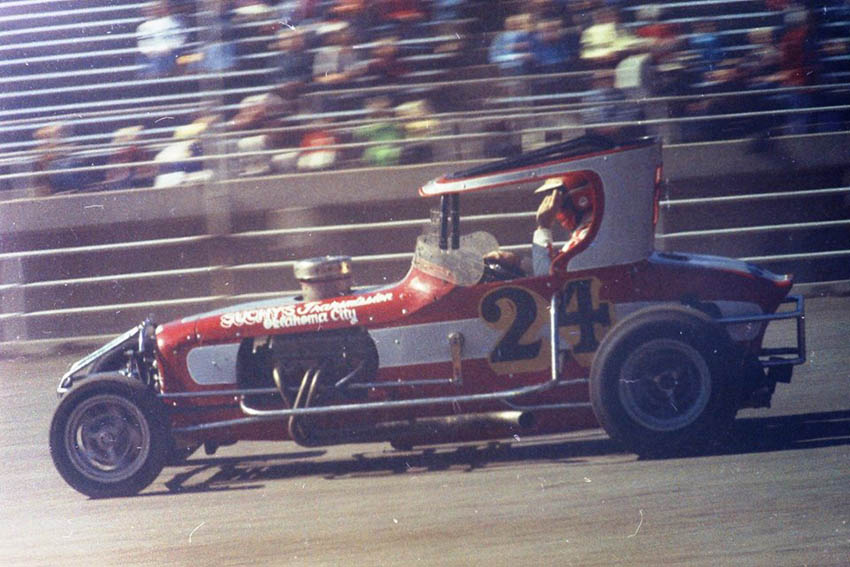
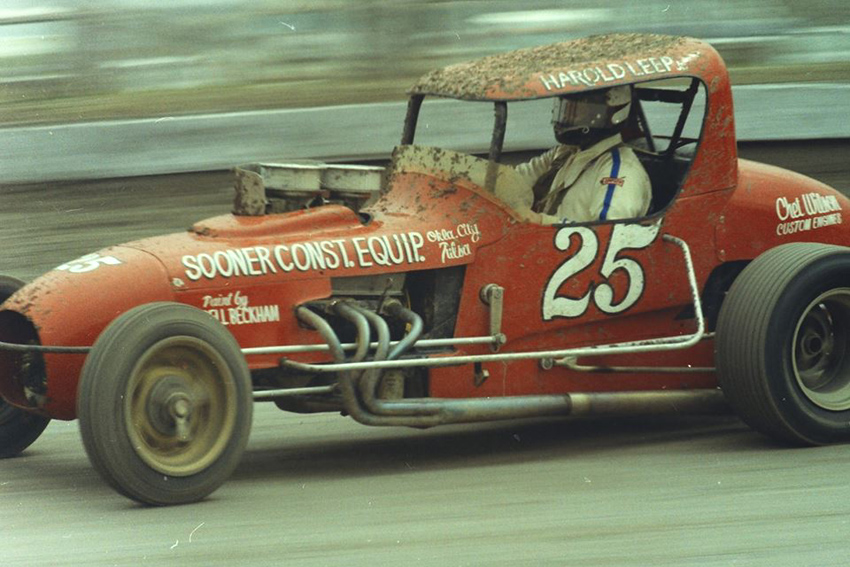
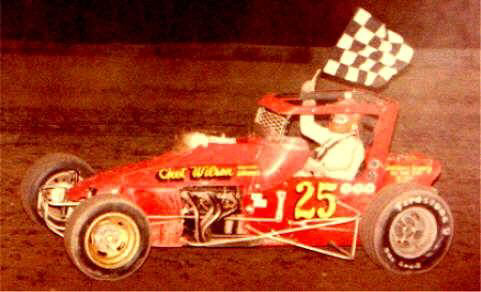
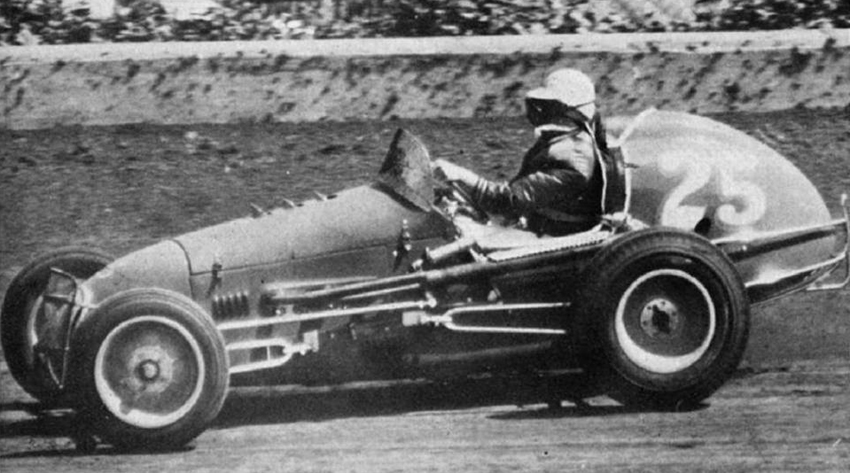
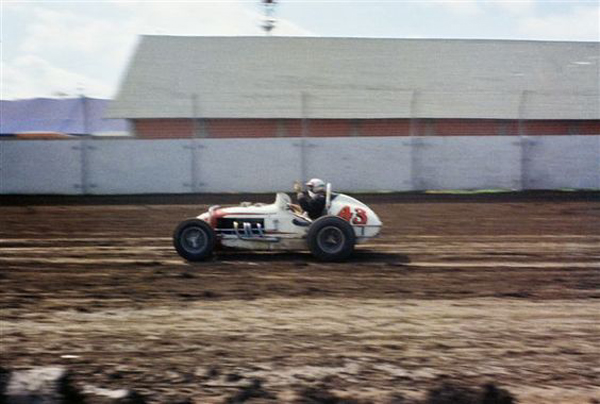
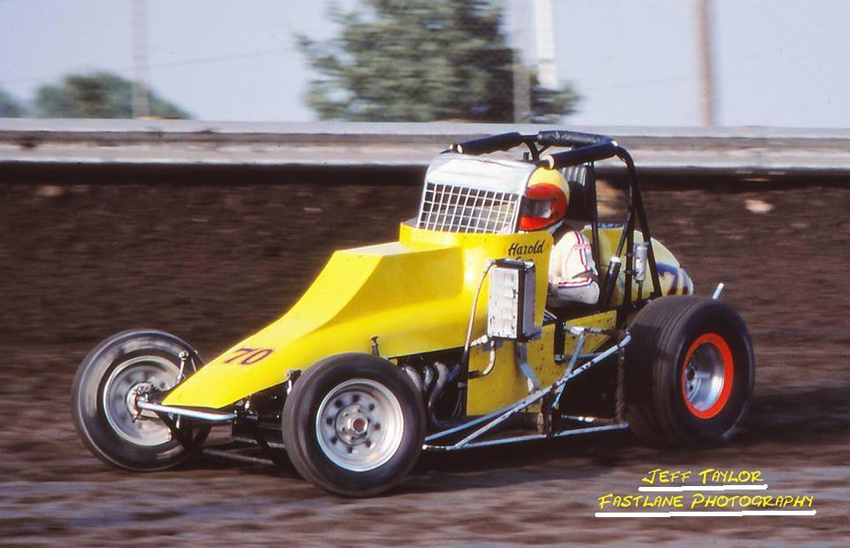
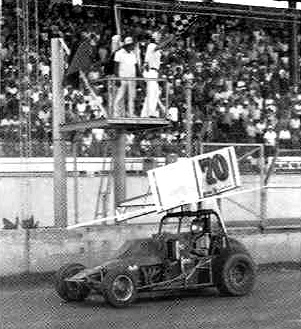
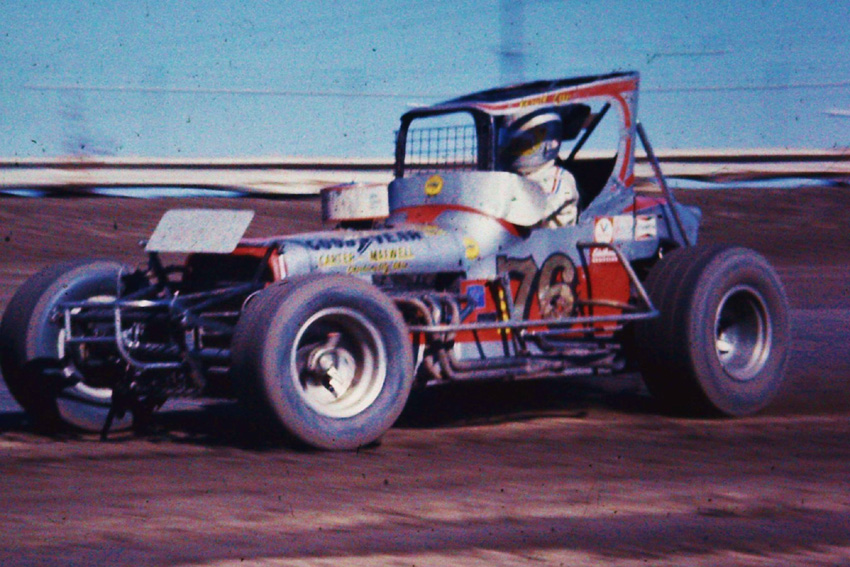
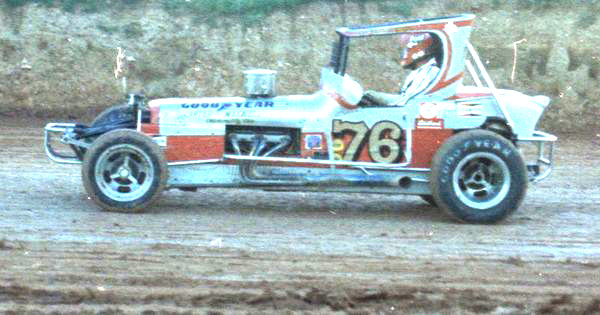
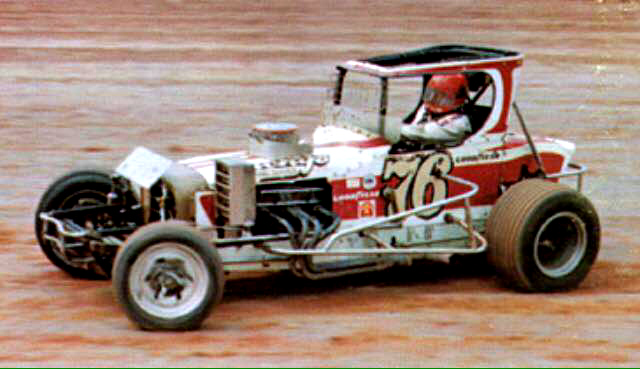
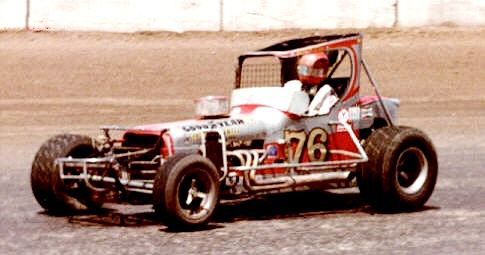
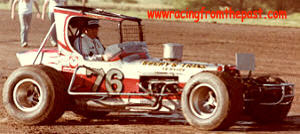
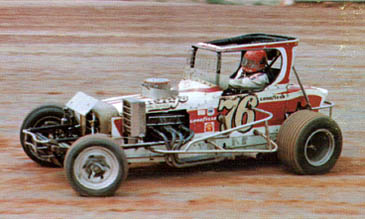
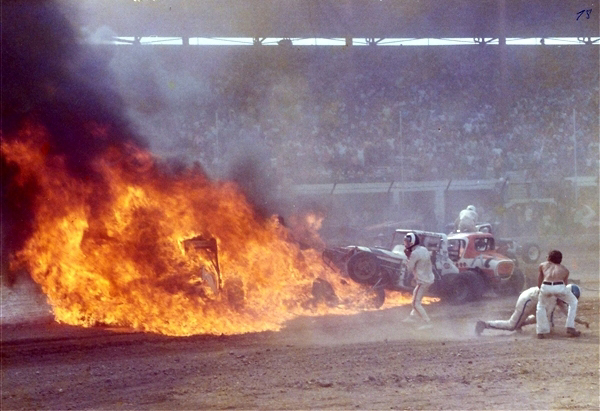
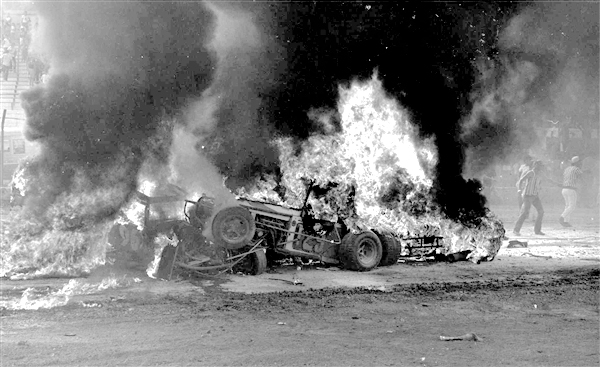
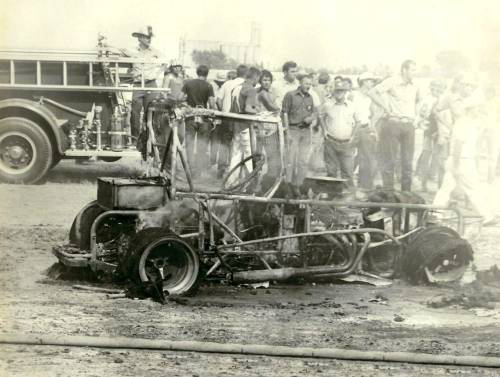
The Harold Leep story by Ray Cunningham
The 20th century produced many great open wheel champions, racing stars that included Foyt, Wolfgang, Larson, Hinnershitz, Jones, and Grim to name a few If I told you that one of those drivers raced for over 30 years, won at least 15 championships during that time, and so many races that we can only estimate the number, what driver would you guess we were talking about? Steve Kinser possibly? The King”. A good guess, but a wrong one, the man in question was racing before Steve Kinser was born, his name is Harold Leep, and he was “The King” of supermodified racing in the heartland during the 60’s and 70s, and one of the best sprint car drivers of the4 late 50’s and 60’s as well. Born in Oklahoma in 1933 during the dust bowl days, Harold Leep’s family moved to Arkansas City, Kansas when he was a youngster. Harold joined the military at age 14, after fibbing about his age.
When Leep returned from the military, (he was still under age at the time), he found his family had moved to Wichita. In 1950 Harold helped a friend finish his jalopy stocker, in exchange for the opportunity to drive it. Leep crashed the car the first time he drove it and was promptly fired. Fortunately for race fans everywhere, Harold was not deterred and raced for 35 years before his retirement.
Like many drivers of that era from Wichita, Harold developed his racing skills in the jalopies at places like Cee Jay Stadium in Wichita. There Leep raced against the best that included, Dale REED. Walt McWhorter, Frankie Lies and Billy Mears (Rick Mears dad) among others. In 1955 Harold raced in his first sprint car race. In 1957 Leep heard that Chet Wilson had built a brand new sprint car for his 283 cubic-inch Chevy, fuel injected custom engine. An engine that at the time was revolutionary in its design, in an era when Offy’s ruled the sprint car land scape. Wilson hired Leep (after much pestering from Harold) and one of the best sprint car teams of the era was born. Over the next several years the red Chevy sprint car dubbed the “Offy Killer” would win numerous races with Leep behind the wheel.
In 1957-58-59, Leep and Wilson won the United Speedways Championship three straight years, once winning 10 races in a row before they lost. In the IMCA ranks Harold finished third place in 1959, 9th in 1960 and third in 1961. In 1960 Harold crossed over to the USAC ranks and raced for Peter Schmidt in his championship car wrenche3d by legendary mechanic Wally Meskowski. Unfortunately for Leep this endeavor led to only one start, a 14th place finish at Syracuse, New York. Though Leep would never end up racing at Indy, USAC’s loss was the heartlands gain as Leep would dominate in the midlands for years to come.
1960 also found Harold racing for the BCRA for the first time. Leep and Wilson raced at Norton, Kansas when the BCRA ventured over to Kansas for the first time in the clubs history. Harold dominated the racing that day sweeping the entire program. In 1962 Harold decided he wanted to race an Offy, and joined forces with Red Lempelius. This team won several times that season including the “Hawkeye Futurity” in Des Moines, and finished 4th place in the final IMCA standings. Teamed once again with Chet Wilson in 1963, Harold’s finished 11th place in IMCA points and brought a bowling alley. Harold announced his retirement from racing at the time. Leep’s retirement was short lived as he was back behind the wheel the very next season.
The 1964 season was another big one for Harold as he finished 4th in IMCA points and added 5 more wins to his IMCA resume. By the 1965 season Harold had decided to cut back on his sprint car activities. This was good news for fellow IMCA competitors as Leep was 4th in points for the IMCA decade 1955-64, trailing only Pete Folse, Bobby Grim and Buzz Barton.
Harold had grown tired of traveling and decided to join up with the supermodified ranks that raced closer to his Wichita home. The Veterans still ventured out on occasion that season, finishing 5th place in BCRA points and winning the Oklahoma State Fairgrounds, as the BCRA raced there for the first time. In 1966 Harold switched sprint car rides with Grady Wade. Wade jumped into the Wilson # 25 and Leep joined forces with Pius Selenke in the 1865 BCRA championship winning # 43 roadster sprinter. This team finished 8th place in BCRA points and won at the Belleville High Banks during fair week. In 1968 Harold teamed with former boss Chet Wilson for one last big win in sprint cars. Grady Wade had been the regular driver for Wilson since the 1966 season winning 6 times. At the Oklahoma State fair that year Wade was not available so Wilson turned to Leep one last time. Harold did not disappoint and won his 28th IMCA feature race since 1957.
Though Harold was done with sprint car racing for the most part, he certainly wasn’t done racing by any means, while his sprint car career was winding down his supermodified career was kicking into high gear. In 1965-1966-1967 Harold won the supermodified track championship at 81 Speedway. In 1967 he won his second modified national championship at Hutchinson, Kansas. From there Harold won 11 out of 13 races he participated in 1968 at Eagle raceway in Lincoln, Nebraska in the fuel injected supermodifieds. In the 100: supers that dominated the tracks of Kansas, Oklahoma and Texas, Harold was the man to beat. In 1969 Harold won the championships at 81 Speedway, the Tulsa Fairgrounds and Oklahoma City. Three championship, three tracks, one season, incredible.
The decade of the 70’s was like the late 1960s; Harold won the track championships at Oklahoma City in 1971, 1976, 1977 and added his third championship at Hutcheson in 1972. In the newly formed NCRA that started in 1971, HROLD WAS ONE OF THE VERY BEST. Leep won the championship in 1972-73 and 1976 in between a few more brief retirements. Harold won 21, 50 lap features from 1971-80 in NCRA competition placing him second on the victory list during that time. In 1975 Harold sold his bowling alley.
The 1980’s was the last decade of racing for the veteran driver. Harold capped his career by winning two more Hutcheson Nationals in 1983-84. During his supermodified hay days. Harold drove for several top owners including Ray Cates, Warren “Jelly” Wilhelm, Laverne Nance, Lonnie Snowden and Pat Suchy. After Harold’s retirement from racing he continued managing his oil and gas company that he started several years before. In 1990 he retired from that venture, and got back to racing in 1991 as promoter at Muscogee, Speedway in Oklahoma, his home since 1982.
In 2000 Leep was inducted into the National Sprint Car Hall of fame in Knoxville, Iowa and the Big Car Racing Association Hall of Fame at the Smith Museum of American Speed, Lincoln, Nebraska. A fitting testament to the man who dominated supermodified racing in the heartland in the 1960s and 1970s, while also being the best sprint car drivers of any area.
MUSKOGEE — Legendary Oklahoma dirt car racer and National Sprint Car Hall of Fame inductee Harold Leep Sr. died Thursday, a day after he reportedly fell on ice at home. He was 81.
The Cookson native last worked in motor sports as promoter of Muskogee Speedway in the early 2000s, but he had long become a legend for his successful exploits on dirt tracks throughout the country, particularly Oklahoma and Kansas. At a time when open-wheel race cars were larger, heavier and did not have the safety features of current-day cars, Leep piled up wins at local tracks and on regional circuits such as the National Championship Racing Association, the U.S. Auto Club and International Motor Contest Association.
“He was larger than life to all of us growing up,” said Shane Carson, a Yukon resident who is a fellow National Sprint Car Hall of Famer. “He changed racing everywhere he ran. He raised the bar. He was a great friend, too.”
Leep's interest in car racing started in 1950, when he volunteered to help a buddy work on a jalopy stock car. Leep convinced the friend to let him race it. After he crashed the car, the friend didn't let Leep drive it again.
But Leep was hooked. He was back inside a stocker in 1951, notching his first career victory, at Enid Speedway. Leep moved to open-wheel cars in 1955, and he began building a tough-to-beat status during a period when the slightest gambles might lead to horrific crashes and severe injury.
“Sprint car racing is the hardest work there is,” Leep told the National Sprint Car Hall of Fame before his 2004 induction. “I was tired of the travel ... but I still wanted to race.”
Leep won a then-record five points championships (1967, 1969, 1971, 1976, 1977) at State Fair Speedway in Oklahoma City. Those complemented season titles (1965, 1966, 1967, 1969) at 81 Speedway in Wichita, Kan. He capped a triple crown in '69 by also winning the Tulsa Speedway championship. He triumphed five times at the Hutchinson (Kan.) Nationals, then the World Series of open-wheel dirt car racing.
And those titles don't scrape the surface of what the Air Force veteran managed in more than 40 summers of driving.
Updated 6/9/18


|

|

|

|

|

|

|

|

|

|

|

|

|

|